#they let scientists do anything in the 19th century
Text
I’m always thinking about at least one Second Voyage of HMS Beagle fact and right now it’s that while Darwin was exploring on land in South America he went by CARLOS and also got a HUGE kick out of the fact that nobody knew what a naturalist was and so he had this card that said “Carlos Darwin, naturalista” which he just waved around and let people believe he was some kind of mad wizard
Like “fuck if I know what ‘naturalista’ means but this gangly Englishman who turned up out of nowhere says that’s what he is and now he’s catching insects and filling his bag with rocks? maybe we should just let him do his thing?”
Ugh what a fun and silly guy
#they let men do fucking ANYTHING in the 19th century#they let white people do anything in the 19th century#they let scientists do anything in the 19th century#I posted a TikTok once about Darwin doing quirky things#and someone said “didnt some 19th century scientist throw a bunch of lizards in the ocean?#I had to say yes. that was also Darwin actually#blorbo. and I cannot emphasize this enough. from my science history#my name is Carlos and I’m a mysterious little wizard guy#please show me to your finest beetles#blorbo from my science history#CARLOS I’m not over it#history
7 notes
·
View notes
Text

Good morning! I hope you slept well and feel rested? Currently sitting at my desk, in my study, attired only in my blue towelling robe, enjoying my first cuppa of the day.
Pumbaa was the first ever character to fart in a Disney movie.
The heaviest human ever recorded weighed 1400 pounds (100 stone).
Thomas Hargrove, a homicide archivist, estimates that there are over 2000 serial killers at large right now.
The average human attention span has almost halved since 2000 decreasing from 20 seconds to 12 in 2018.
Sir Isaac Newton was just 22 when he discovered the universal law of gravity. He also died a virgin.
Scientists discovered traces of cannabis on the pipes found in William Shakespeare's garden.
Bill Gates changed his school's program codes so he was placed in class with mostly female students.
The day after Thanksgiving is generally the busiest day of the year for American plumbers. It's called ‘Brown Friday’.
Adidas will cancel any sponsorship deal that they have with a player if it turns out they have anything to do with Scientology.
Pleonasm is the term for a redundant expression, like ‘ATM machine’, ‘hot water heater’, ‘free gift’ or ‘lying politician’.
Experiments show that male rhesus macaque monkeys will ‘pay’ to look at pictures of female rhesus macaques' bottoms.
The deadliest female serial killer in US history, Clementine Barnabet, had murdered 35 people with an axe by the time she was 18 years old.
In the Tasmanian Devil mating season, the male has to beat the female into submission if he wants to mate. If the male is too weak, the female proceeds to beat up the male.
In 2016, a 70-year-old man robbed a Kansas City bank and then sat down in the lobby, saying he'd rather live in jail than with his wife. He was sentenced to six months of house arrest.
In the 1980s, Nintendo employed ‘game counsellors’. If you were stuck in a game, you could call them, and they would coach you through it.
Thomas Wadhouse was an English circus performer who lived in the 18th century. He is most famously known for having the world's longest nose, which measured 7.5 inches (19 cm) long.
Orgasms were thought to treat 'hysteria’ in women during the 19th century, but doctors were tired of fatiguing their hands, so the modern-day vibrator was created.
In 1939, the New York Times predicted that the television would fail because the average American family wouldn't have enough time to sit around watching it.
Having bridesmaids in a wedding wasn't originally for moral support. They were actually intended to confuse evil spirits or those who wished harm on the bride.
A man named László Polgár developed a method to raise child prodigies. He wrote a book on it, married a language teacher, and they raised the world's best and second-best chess players.
During the Iranian embassy siege in London, back in 1980, when given the choice of who from the group of hostages would be released, they chose Ali Guil Ghanzafar, whose loud snoring was keeping them awake.
When trains were introduced in the U.S, many people believed that women's bodies were not designed to go at 50 miles an hour, and that their uteruses would “fly out” of [their] bodies if they were accelerated to that speed.
In 1978, Richard Branson wanted to impress his girlfriend by pretending to buy a private island. The island was listed for $6 million and he offered $100k as a joke. The owner settled for $180k, and Branson bought Necker Island.
A writer by the name of Lisa Holst created an article in 1993 stating that “around 8 spiders crawl into your mouth every year whilst you sleep”, but the whole thing was made up to prove that the internet was gullible and doesn’t fact check its sources. It's actually more like 20.
In 1140, when King Conrad III of Germany captured a castle, the women of the castle were granted free departure and allowed to take what they could carry on their backs. Thinking quickly, some women carried a man on their backs. The king kept his word and let the men go.
A woman who developed a strange addiction to eating mattresses vowed to stop after she wound up eating not only her own bed but also her mother's. This story comes from the TLC series ‘My Strange Addiction’ and focuses on a woman named Jennifer who was 26 at the time she was featured on the show in 2013. According to the documentary Jennifer used to eat .09 square metres of a mattress a day and had consumed 8 mattresses within 20 years. She admits that she began eating her mother's mattress after she finished eating her own and usually gets the urge around 2 o'clock in the afternoon or after sex.
Okay, that’s enough information for one day. Have a tremendous and tumultuous Tuesday! I love you all.
#mixcloud#mi soul#dj#music#new blog#lockdown#coronavirus#books#weekend#democracy#brexit#cronyism#election#tuesdaymotivation#radio
3 notes
·
View notes
Text
Something different today! A bit of existential philosophy about the nature of god(s) and creation from the Layered Earth. WIP day 9.
-
What of the Gods?
-
There are many gods, goddesses, deities, divinities, supreme beings, etc, etc, but what are they really? Many philosophers have tried to answer this question, as have scientists of all stripes, from biologists to physicists to locuschemists to chronopsychologists. Alchemists and theologians, magic practitioners and daydreamers alike have thought long and hard about the gods. But, perhaps, it is 19th century French humanist philosopher and astrumphysicist Gilbert Jean-Pierre who most concisely stated the nature of gods.
“He, or They, or It is not our creator, as no god, nor gods, is, nor are. Gods only exist because of Humanity; We are the true creators. That is why gods are always comprehensible, why they always appear as animals or humans or immobile objects, yet seem to be many things at once. What other explanation exists for why the Wolf of War carries the SPQR banner? Or for why the Captain of Industry exhales smoke that smells of sweat and stings like tears?
That is humanity’s greatest power. Through our beliefs, We create gods. Is there no greater proof of our power? Of our strength?”
Though Honorable Jean-Pierre is certainly correct, at least in the aspect that gods are, in part, the creation of humanity, there are far more nuances that this famous quote doesn’t cover. So, let’s cover them here.
What are gods?
The big question. ‘God’ is a very broad term, much like ‘dragon’ or ‘demon’ or ‘fairy/faerie’. But, in general, ‘gods’ are powerful supernatural entities that are conventionally immortal and conventionally immaterial. In this case, ‘conventionally immortal’ means that they do not die of injury, sickness, or bodily failure, while ‘conventionally immaterial’ means that they may or may not exist at any point in space-time that they have access to.
How are gods made?
Another big question. The simplest answer is that humanity thinks them into being. The complicated answer goes something like this:
1. A decent portion of Humanity collectively latches onto a concept. This could be something as big as ‘civilization’, or as small as ‘this chord followed by this chord is really pretty’. Most of the time, small-scale ‘latchings’, as the professionals call it, don’t lead to the creation of gods, as humanity fails to fulfill the next few steps. The number of people needed to cross the ‘latch’ threshold is rather small, sometimes as small as a single family.
2. The portion of Humanity assigns some characteristics to the latched concept. This could be anything from ‘the stars are the campfires of our ancestors’ to ’cactus are mean’. The characteristics must be somewhat consistent within the portion involved.
3. The portion of Humanity begins creating stories or associating occurrences with the latched concept. These run the gambit from ‘the leopard’s spots are the eyes of the people it killed, doomed to forever serve their killer in hunting more prey’ to ‘every time that plant grows, there’s a really big drought coming, so the plant is magic’. The stories or occurrences must be somewhat consistent within the portion involved.
4. The portion of Humanity begins linking unrelated occurrences or preexisting stories to the latched concept. These can be anything from ‘the roaring waves of the ocean are the wails of the drowned dead directed to the heavens where the exalted dead go’ to ‘that eagle who hunts fish is the reincarnation of the first hunter of fish ever’. These linked stories do not have to be consistent within the portion, they must simply be made in some form.
5. The portion of Humanity must maintain or evolve this existing paradigm of stories, personification, association, and concepts for a long enough time or intensely enough to for a god to form. If the portion begins actively worshipping the latched concept as a god or similar extant being, one will form to fit the mold. Gods born from active worship are less prone to change and/or drift. If the portion does not actively worship the latched concept but still maintains it in some form, a god will eventually form. Gods born without active worship are more prone to change and adaptation to new paradigms.
#worldbuilding#layered earth#writeblr#writblr#philosophy#like its technically fake philosophy but also kinda real philosophy#humanity doesnt physically create gods but we kinda do create gods#its weird and existential and a bit lovecraft to be honest
0 notes
Text

I posted 3,485 times in 2022
That's 329 more posts than 2021!
97 posts created (3%)
3,388 posts reblogged (97%)
Blogs I reblogged the most:
@that-g3-obsessive
@kennydontknowsh-t
@marten-blackwood
@whatisr3alityy
@bansheeoftheforest
I tagged 1,062 of my posts in 2022
#the glass scientists - 223 posts
#marble hornets - 153 posts
#tgs - 133 posts
#tgs jekyll - 60 posts
#tgs lanyon - 49 posts
#i love this - 46 posts
#robert lanyon - 30 posts
#mh jay - 29 posts
#dbh - 29 posts
#detroit become human - 28 posts
Longest Tag: 136 characters
#sometimes i feel like i need to keep moving or i’ll die. like a shark. except i’m not moving towards anything. just swimming in circles.
My Top Posts in 2022:
#5
So the new tgs page just came out and I need to talk about it because I have a lot to say about it
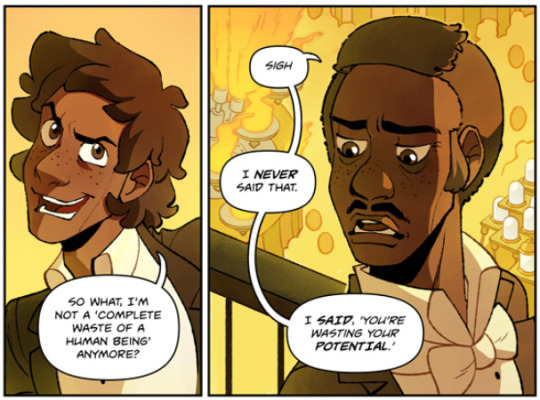
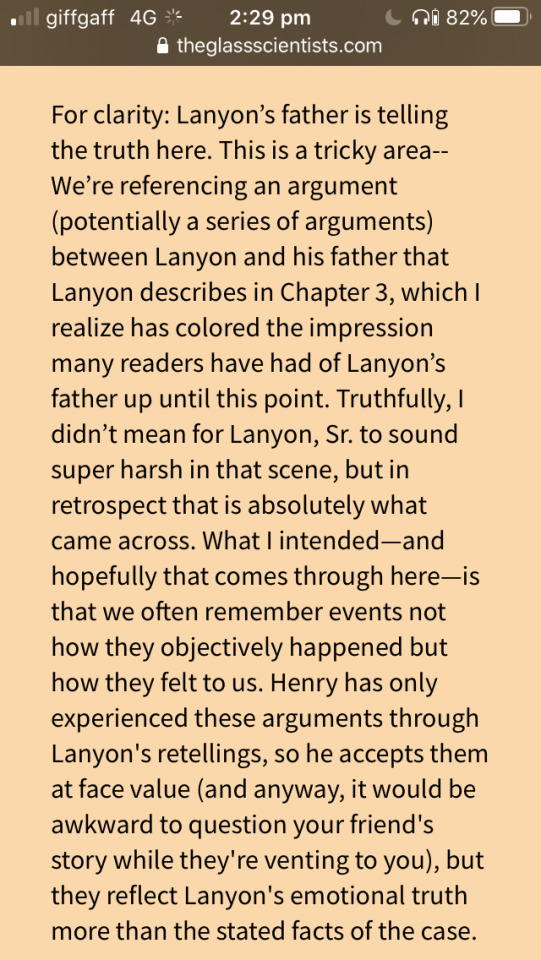
See the full post
91 notes - Posted September 12, 2022
#4
More over the marble wall au drawings from my sketchbook because I just figured out how to draw Beatrice

I’ve had it suggested to me to make Jessica Beatrice which I think would be a cool concept but I’m not 100% sure, if you think it’s a good idea definitely let me know.
I’m also debating wether or not to keep Hoodie and possibly Masky’s (if I include them) outfits in this au more modern or kept within the setting of the Unknown (so more 19th century but still mostly inspired by their normal designs) idk
bonus digital drawings of Beatrice I made while trying to learn how to draw her lol
See the full post
112 notes - Posted November 9, 2022
#3
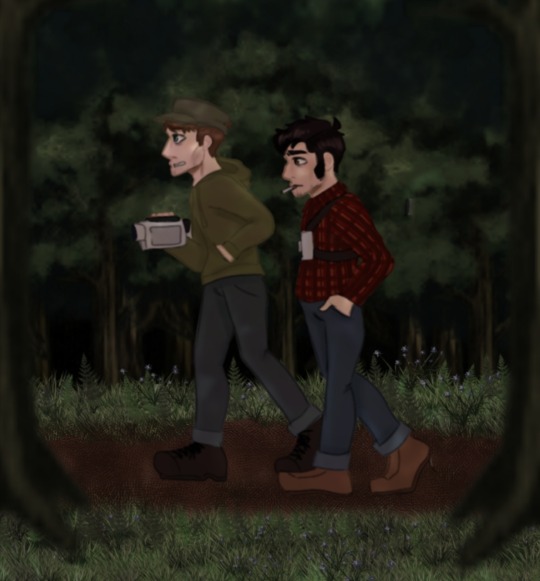
Have I mentioned that I love Marble Hornets?
130 notes - Posted August 16, 2022
#2
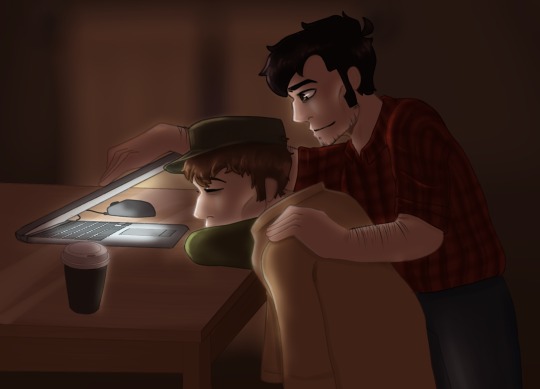
(Tap for better quality please I put so much detail into this)
Jay stayed up too late editing and fell asleep at his desk.
Tim may have put his jacket over him, shut his computer off and brought him coffee in the early morning
131 notes - Posted October 3, 2022
My #1 post of 2022
Finally finished that fake cover I edited for my au!
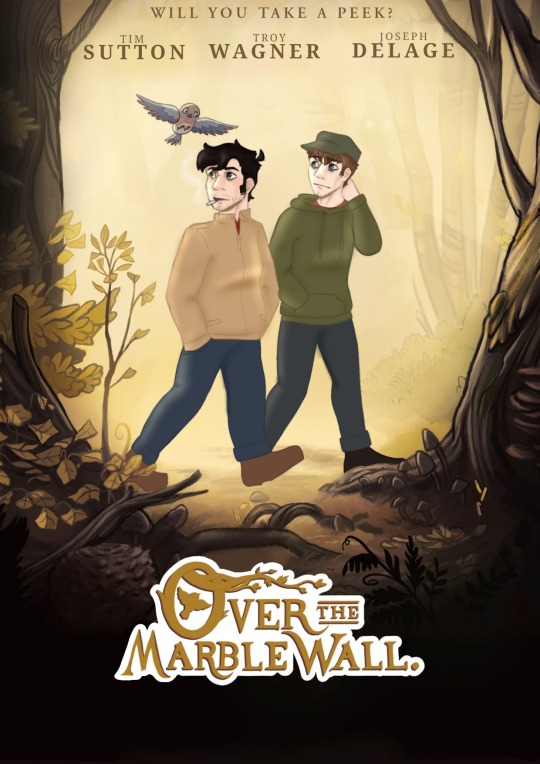
I'm so happy with it!! I think it looks really cool and I'm very proud of it. The drawing of Jay and Tim I made fits surprisingly well I think!
Very excited to do more of this au!!!
Thanks to @jaybirdism and @sealbirdy for the encouragement on this au, probably the main reason I got this done so quickly lol
Original unedited image + separate drawing of Jay and Tim beneath the cut. Once again I take no credit for the original!
Jay and Tim (originally drew it on a separate canvas so I thought I'd post the close up of it separately):
See the full post
145 notes - Posted October 30, 2022
Get your Tumblr 2022 Year in Review →
0 notes
Text
WHAT IS SPACE-TIME MADE OF??
Blog#98
Saturday, June 19th, 2021
Welcome back,
People have always taken space for granted. It is just emptiness, after all—a backdrop to everything else. Time, likewise, simply ticks on incessantly. But if physicists have learned anything from the long slog to unify their theories, it is that space and time form a system of such staggering complexity that it may defy our most ardent efforts to understand. Albert Einstein saw what was coming as early as November 1916. A year earlier he had formulated his general theory of relativity, which postulates that gravity is not a force that propagates through space but a feature of spacetime itself. When you throw a ball high into the air, it arcs back to the ground because Earth distorts the spacetime around it, so that the paths of the ball and the ground intersect again.
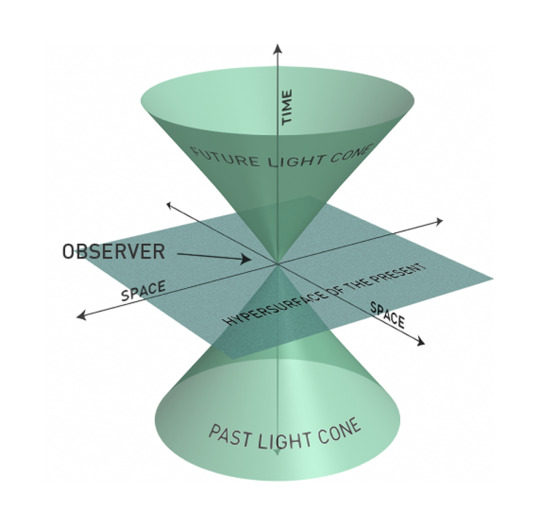
In a letter to a friend, Einstein contemplated the challenge of merging general relativity with his other brainchild, the nascent theory of quantum mechanics. That would not merely distort space but dismantle it. Mathematically, he hardly knew where to begin. “How much have I already plagued myself in this way!” he wrote. Einstein never got very far. Even today there are almost as many contending ideas for a quantum theory of gravity as scientists working on the topic. The disputes obscure an important truth: the competing approaches all say space is derived from something deeper—an idea that breaks with 2,500 years of scientific and philosophical understanding.
Down the Black Hole
A kitchen magnet neatly demonstrates the problem that physicists face. It can grip a paper clip against the gravity of the entire Earth. Gravity is weaker than magnetism or than electric or nuclear forces. Whatever quantum effects it has are weaker still. The only tangible evidence that these processes occur at all is the mottled pattern of matter in the very early universe—thought to be caused, in part, by quantum fluctuations of the gravitational field.

Black holes are the best test case for quantum gravity. “It’s the closest thing we have to experiments,” says Ted Jacobson of the University of Maryland, College Park. He and other theorists study black holes as theoretical fulcrums. What happens when you take equations that work perfectly well under laboratory conditions and extrapolate them to the most extreme conceivable situation? Will some subtle flaw manifest itself?
General relativity predicts that matter falling into a black hole becomes compressed without limit as it approaches the center—a mathematical cul-de-sac called a singularity. Theorists cannot extrapolate the trajectory of an object beyond the singularity; its time line ends there. Even to speak of “there” is problematic because the very spacetime that would define the location of the singularity ceases to exist. Researchers hope that quantum theory could focus a microscope on that point and track what becomes of the material that falls in.

Out at the boundary of the hole, matter is not so compressed, gravity is weaker and, by all rights, the known laws of physics should still hold. Thus, it is all the more perplexing that they do not. The black hole is demarcated by an event horizon, a point of no return: matter that falls in cannot get back out. The descent is irreversible. That is a problem because all known laws of fundamental physics, including those of quantum mechanics as generally understood, are reversible. At least in principle, you should be able to reverse the motion of all the particles and recover what you had.
A very similar conundrum confronted physicists in the late 1800s, when they contemplated the mathematics of a “black body,” idealized as a cavity full of electromagnetic radiation. James Clerk Maxwell’s theory of electromagnetism predicted that such an object would absorb all the radiation that impinges on it and that it could never come to equilibrium with surrounding matter. “It would absorb an infinite amount of heat from a reservoir maintained at a fixed temperature,” explains Rafael Sorkin of the Perimeter Institute for Theoretical Physics in Ontario. In thermal terms, it would effectively have a temperature of absolute zero.

This conclusion contradicted observations of real-life black bodies (such as an oven). Following up on work by Max Planck, Einstein showed that a black body can reach thermal equilibrium if radiative energy comes in discrete units, or quanta. Theoretical physicists have been trying for nearly half a century to achieve an equivalent resolution for black holes. The late Stephen Hawking of the University of Cambridge took a huge step in the mid-1970s, when he applied quantum theory to the radiation field around black holes and showed they have a nonzero temperature. As such, they can not only absorb but also emit energy. Although his analysis brought black holes within the fold of thermodynamics, it deepened the problem of irreversibility.

The outgoing radiation emerges from just outside the boundary of the hole and carries no information about the interior. It is random heat energy. If you reversed the process and fed the energy back in, the stuff that had fallen in would not pop out; you would just get more heat. And you cannot imagine that the original stuff is still there, merely trapped inside the hole, because as the hole emits radiation, it shrinks and, according to Hawking’s analysis, ultimately disappears. This problem is called the information paradox because the black hole destroys the information about the infalling particles that would let you rewind their motion. If black hole physics really is reversible, something must carry information back out, and our conception of spacetime may need to change to allow for that.
SOURCE: www.nature.com
COMING UP!!
(Wednesday, June 23rd, 2021)
“WHAT IS SPACE-TIME MADE OF?? PT.2”
#Astronomy#astronomyclub#astronomylover#astronomyfacts#astrophotography#astrophysics#quantum physics#atmosphere#physics#alternate universe#white universe#how will the universe end#Parallel Universe#universe#outer space#spacecraft
170 notes
·
View notes
Text
The Shared Dalek Universe of the 1960s: A Case Study
In 2011 (a little over ten years ago!), El Sandifer cited my dearly-beloved 1960s Who Annuals as examples of stories which ended up influencing the TV series many years down the line despite making an unrepentant hash of continuity.
Her first example is that the Doctor is called Dr. Who, and that he alternates between being from Earth on one page, and not being from Earth three pages later. I would point out that TV was doing much the same thing in those days, and went on flip-flopping basically until Jon Pertwee, so it’s not a terribly good argument to begin with.
However, she spends more time pondering the Daleks of the comics. These Daleks, she notes, are very different from those on television at the time. There are hordes of them, they travel in fleets of saucers, and they’re ruled by the Emperor. This contradiction, she argues, later fed back into the TV series in the RTD era, when huge fleets of Daleks became the norm and, earlier but still well after the first burst of Annuals, in the form of Patrick Troughton facing a very different Dalek Emperor in The Evil of the Daleks.
In no way do I wish to undermine Sandifer’s ultimate conclusion that “canon” in the sense of diegetic consistency is a red herring of little importance, and what matters for any sane definition of ‘canon’ is whether a story is referenced at all, not whether it’s contradicted.
However.
Having gone back to 1966′s The Dalek Outer Space Book, I have made a very startling discovery, in the story entitled The Secret of the Emperor. The rest is after the cut; I will leave you with a delightful panel from this story, showing the “bewildered” Dalek Emperor being bullied by knights at the Battle of Agincourt. (This is one of my favourite Doctor Who images ever, and if it doesn’t put a smile on your face I am not sure I want to take you seriously.)
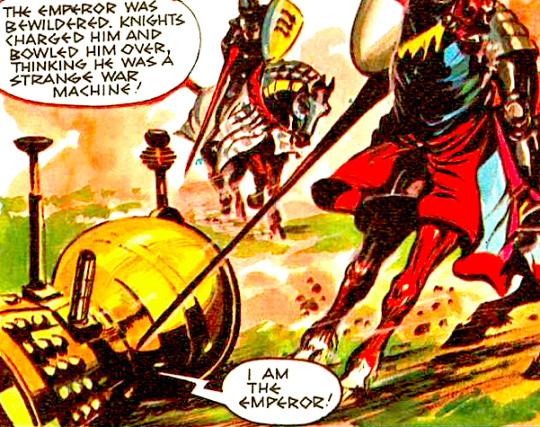
So, famously, when he debuted in the comics, the Dalek Emperor was not the giant, static Dalek later shown on television in The Evil of the Daleks and The Bad Wolf of the Ways; instead, he was golden, squat, and had a bulbous head; to house all the ego, one expects.
Thus, most people will point at the fact that when the Doctor met “the Emperor” in The Evil of the Daleks, he resided in a huge tower-like casing in the Dalek City, as evidence that although ideas received a first treatment in the comics which later made it to screens, no direct continuity was intended; the comics’ Emperor was an alternate, a first draft, to be discarded once a more definitive TV portrayal emerged.
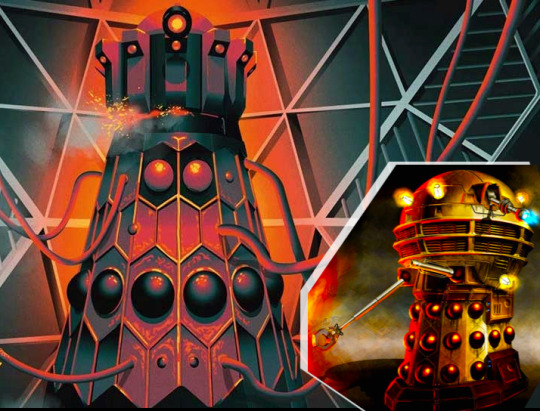
And yet, of course, it is somehow appealing to think of the two as the same Dalek, isn’t it? John Peel (Dalek writer voted most likely to be a 19th century Victorian man who stumbled into a time eddy; it’s mostly the remarkable sideburns) spent a lot of time in his Dalek novels establishing the life story of the Dalek Prime, the First Dalek Ever, who transitioned from the globe-headed casing to the towery Evil one and then deeply regretted it, what with the “getting killed by his own infighting troops with no way to escape”.
But this is usually viewed as a retcon. A cute retcon, an admirable retcon even, but a retcon. My good friend and esteemed fellow canon-welder, @rassilon-imprimatur, espoused such a view four years ago:

Well, all of this is, if you’ll pardon my French, bollocks. John Peel didn’t make anything up, except for the snappy name of “the Dalek Prime” as a designation for the individual. The Dalek Emperor in Evil of the Daleks was always the Emperor of the 1960s comics, and there is a very good reason for his seemingly-contradictory change of appearance. What’s more, I am not talking about murky authorial intent: these are things that the discerning Dalek fan in 1967 was meant to have known.
Let me wind back the clock to 1966. A Dalek master-plan is unfurling, a multi-media agenda spanning several years, more ambitious perhaps than even Time Lord Victorious in its scope; for the ultimate aim of a small cabal of men including David Whitaker, Terry Nation and Brad Ashton is nothing less than spinning the Daleks out of Doctor Who and into their own non-BBC TV show — to be made in America, and in colour, if you please!
For over a year now, a Dalek story arc has been running in the pages of TV Century 21, tracking the early rise of the Dalek Empire and its early interactions with 2060s humanity. Though the Daleks encroach over other parts of the book, including the headline stories, the bulk of this story arc comes in the form of weekly one-page comics making up one long serialised history of the Daleks, under the minimalist title of The Daleks.

Also under the solo brand of “The Daleks”: Annuals, an exclusive audio story, and, of course, toys. Time for Phase Two. It is time to end the Daleks’ endless confrontations with Dr Who on television, and set the stage for a new status quo able to support the TV series Nation dreams about.
Important background: Terry Nation, famously, does not like the Dalek Emperor. Whitaker made him up without consulting Nation, who maintains that the highest rank in the Dalek hierarchy should be the Dalek Supreme. The Emperor was hard to do away with in the comics, since he was basically the protagonist of the TV21 strip, but one imagines Nation was keen to jettison him from the world of the planned TV series.
I am speculating, of course, but I picture Nation sitting in his office, pondering the two great thorns in the side of the Independant Daleks Masterplan.
Thorn one: the Daleks are entangled with the Doctor both diegetically and symbolically; unless something can be done, the Daleks will remain “the Doctor’s enemies”, and a show where they commit evil and the Doctor fails to show up would ring false with the kids watching. The Daleks must be removed from Doctor Who in a sensational and definitive manner, or the whole enterprise is a nonstarter.
Thorn two: I, Terry Nation, have foolishly allowed David Whitaker to shape the lore of the Daleks, and he has made this Dalek Emperor guy very central to early Dalek history, leading up to the 22nd century Dalek Invasion of Earth that most of the Doctor’s subsequent conflicts with the Daleks have stemmed from. But I do not like the Dalek Emperor. I wish I could get rid of him in my new status quo.
…………Aha.
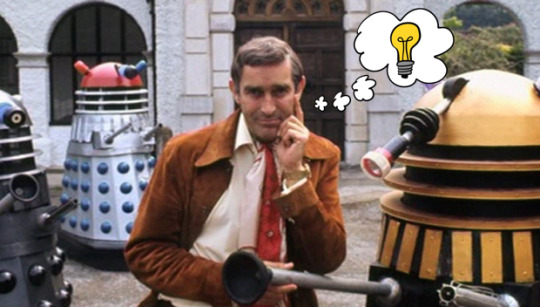
A triumphant Terry Nation adds a post-it note to the ever-widening corkboard representing the multimedia Dalek Masterplan setting up the TV series, which must already include things like “convince Jean Marsh to come back as Sara Kingdom”. Notes distilled from this corkboard will form the backbone of The Dalek Outer Space Book, this year’s Dalek annual, which exists principally to set up the prospective main characters of the new TV series: Sara Kingdom and Agent Mark Seven, of the Space Security Service.
The new post-it note reads:
Construe the Daleks’ enmity with the Doctor as a personal enmity between the Doctor and the Emperor, a la Sherlock Holmes and Moriarty. Have the Doctor triumph over the Emperor on TV in a big ‘event’ story.
Result: the Doctor-vs-Daleks storyline is over; the Emperor is dead; I get everything I ever wanted.
(Except maybe a pony.)
Then he phones David Whitaker, smirking all the while like an evil genie preparing to grant a badly-worded wish.
“Good news, old chap, I’ve decided you can write a new Dalek story for the BBC, all by yourself. I promise I won’t interfere.”
*confused and delighted David Whitaker noises*
“ And you can even bring in that Dalek Emperor of yours. Yes, you heard me!”
*Whitaker enthusiasm intensifies*
“Ahhh, but there’s a catch. The Dalek Emperor must DIE.”
Of course, like all good Faustian bargains, this is irresistible even though it is ruinous and the victim knows it to be ruinous. Whitaker agrees to the scheme. He and Nation begin planning out the events of the great finale of the Dalek-Doctor confrontation, which will hit the screens in 1967 as the mildly racist, but otherwise quite well-loved, ‘The Evil of the Daleks’.
Quickly enough, it is decided that Patrick Troughton crouching to berate the short and bubble-headed Golden Emperor would look silly. If the Emperor appears on TV, alongside human performers, then it should tower over them. Besides, this is to be the archvillainous Dalek Emperor’s last stand, and certain traditions must be followed.
Hence another task is added to the bucketlist of the Dalek Outer Space Book: tell the story of how the Emperor transformed from the globe-headed dwarf to some huge and terrible towering form under the Dalek City, for the Doctor to stumble onto later. This rebuilt Emperor may be teased, but must not be truly seen or truly defeated in the book; that would defeat the whole idea.
Hence, The Secret of the Emperor, a story which sees the Emperor becoming self-conscious about his own efficiency and letting the Scientist Daleks rebuild his casing from scratch. The final page is a splash panel, a delightfully nonsensical diagram of the mechanical components of the new casing.
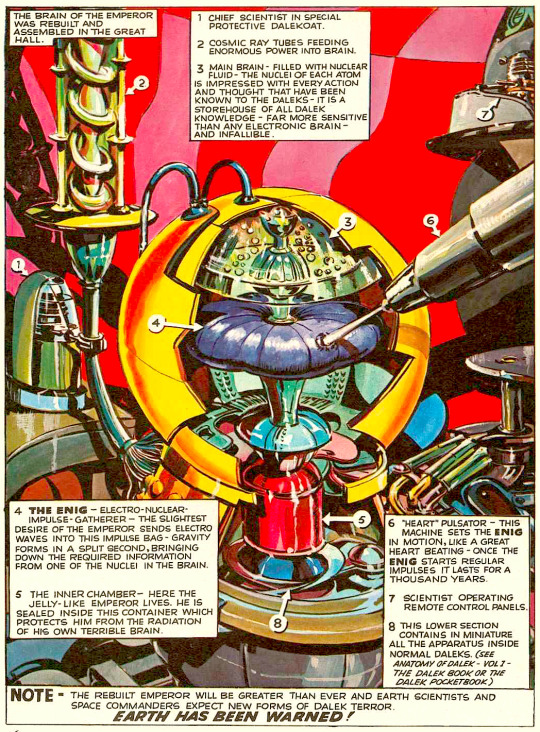
The almost surreal array of colours and shapes is so arresting as to obscure an important detai. Many have seen this page over and over, and yet still missed it. The recent(ish) ‘Anatomy of the New Dalek Emperor’ artwork from Time Lord Victorious clearly looked at this page for reference, in spite of the fact that the TLV Emperor is much more inspired by the old Emperor than the rebuilt one.
Let me spell it out for you: look at the Scientist Daleks in the top right and centre-left. Look at them.
The new Emperor is huge.
And what else?
That Scientist on the left is plugging huge wires snaking from the wall into the tower-casing.
He now resides in the Great Hall of the Dalek City.
The background wall is a weird checkered pattern.
In addition, the following facts are seeded throughout the earlier pages of The Secret of the Emperor.
The point of moving to the new casing was to grant the Emperor increased brain capacity (suitable for concocting masterplans).
He acquired said increased brain capacity to help the Daleks attempt to overcome humanity once and for all.
The Emperor has recently had a trautmatic but eye-opening experience with time travel.
Ignore the fact that the Emperor was here depicted with what appears to be a still fairly bulbous, and golden, head, and it doesn’t take a genius to figure out that this is very, very direct setup for how the Doctor finds the Dalek Emperor in The Evil of the Daleks — tower-like, in an imperial throneroom in the Dalek City, with a checkered wall pattern, planning out a complicated scheme to harness time travel as a means of defeating humanity once and for all!
Yes, the designs don’t quite match — but how could the artist behind the visuals of Secret of the Emperor have known precisely what Shawcraft would build, a year later, based on the same basic description by Nation & Whitaker? The parallels far outweigh the minor differences in execution. (It’s worth noting that elsewhere in the Outer Space Book a different artist drew what was clearly intended to be the Golden Emperor as a large, golden, but normally-proportioned Dalek, so it’s not like the visual descriptions of these scripts were exceedingly precise…)

The rebuilt Emperor is never seen in the Outer Space Book outside of this ‘dissection’: he is heard throughout The Brain Tappers but kept carefully off-panel, and his new and dangerous new casing is pointedly not destroyed in the story’s conclusion. Well, of course not. That’s what Dr Who is for.
tl;dr: it is not a post hoc retcon, or even a secret, that the round-headed Emperor of the comics became the Dalek Emperor of Evil of the Daleks. A holistic view of the state of Dalek media in 1966-1967 shows that, in fact, it was the whole point that this be the Emperor of the comics; and that the comics had begun setting this up long before Patrick Troughton encountered Edward Waterfield on TV.
And thus, to circle back to Sandifer’s 2011 post, it is not enough to simply say that the “seemingly non-canon” comics inspired the show down the line. In fact in this instance, what appeared on Doctor Who existed for the benefit of the Daleks spin-off — not vice-versa!
#Daleks#Canon-Welding#Doctor Who#Analysis#Doctor Who Meta#Dalek Emperor#Dalek Prime#The Evil of the Daleks#Terry Nation#David Whitaker#Brad Ashton#The Secret of the Emperor#El Sandifer#Canon#Jacob Black
70 notes
·
View notes
Text
Top 5 Things That Will Kill You In the Victorian Era
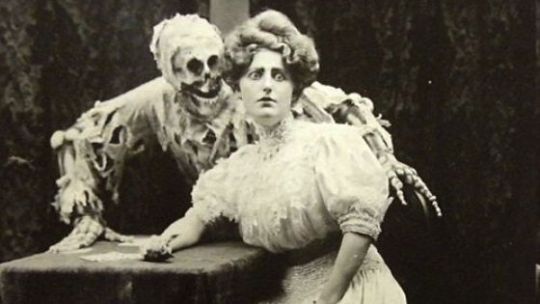
If you’ve ever spent more than two seconds with me, you know that I live and breathe the fog-choked air of Victorian London. All day. Every day of my life.
See, in many ways, the Victorians were the first version of us--overwhelmed by rapidly-changing technology (and its awful effect on the climate); dealing with incredible wealth gaps; grappling with rising crime and faster travel and out-of-control media and the whole, “God is dead, oh no” thing.
Also, everything was trying to kill you.
Like, literally almost everything.
From your clothes to your doctor to your canned food, here are the top five things that will kill you in the Victorian era.
5. Other Victorians
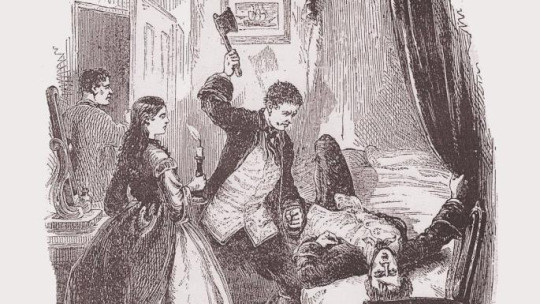
If the rise of penny dreadfuls (cheap magazines stuffed with horror stories for us morbidly-inclined goth types) was any indication, Victorians loved them some true crime.
And there was no shortage of subject matter to choose from: depending on where you ventured in London, at least, you could be subject to anything from pickpocketing to mugging to violent assault and, of course, murder.
There were a few reasons for this:
For one thing, the population in London alone increased by millions in the 19th century, and approximately no one was prepared for that. So, to accommodate the rapidly-booming population, the wealthy folks in charge reached out and lovingly ensured the masses of the disenfranchised poor were taken care of by redistributing resources and education and access to opportunities that improved lives on a both a personal and social level.
Lol, no, I’m totally kidding; they shoved them into slums and tenement buildings and pretended they didn’t exist.
So of course, there was a rise in crime, because if you have five kids and you can’t find gainful employment and your family will starve if you don’t steal that basket of food over there, or that purse that lady left sitting over THERE, what are you going to do? You’re going to steal the food and the purse to survive, Jean Valjean, I understand, I do.
Except the powers that be did NOT understand, and instead routinely espoused the idea that if people were poor, it was because they were morally bankrupt, or inherently bad, somehow, and the “criminal classes,” as they came to be known by the growing Victorian middle and upper-middle classes, were simply considered genetically bad to the bone and therefore undeserving of assistance.
Basically:
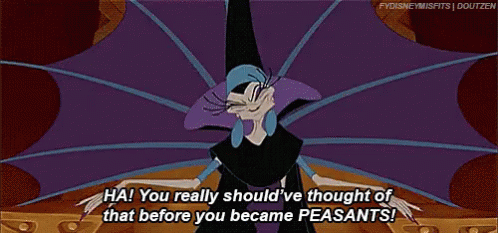
So ANYWAY.
Crime was on the rise and there were multiple efforts to stop it with varying degrees of success, but big city usually = big crime, especially when there’s a massive gap between the one percent-ers and THE REST OF US, WASHINGTON.
Ahem.
All that crime? The booming news industry loved it. The press ate it up and then spit it back out in salacious headlines that never even bothered with journalistic objectivity, like this gem:

I mean. Full disclosure: I, too, agree that cutting off a woman’s head, arms, and legs and then burning them is “awful, inhuman, & barbarous” but just...maybe...maybe tone it down? Just a bit?
No? Okay.
See, here’s the thing: crime sells. It always has. And papers went nuts with full illustrated spreads about the latest brutal murders so you could sit in your parlor and get anxiety poops thinking about how the butcher down the street looked at you funny the other day and oh, God, you’re probably next, oh God.
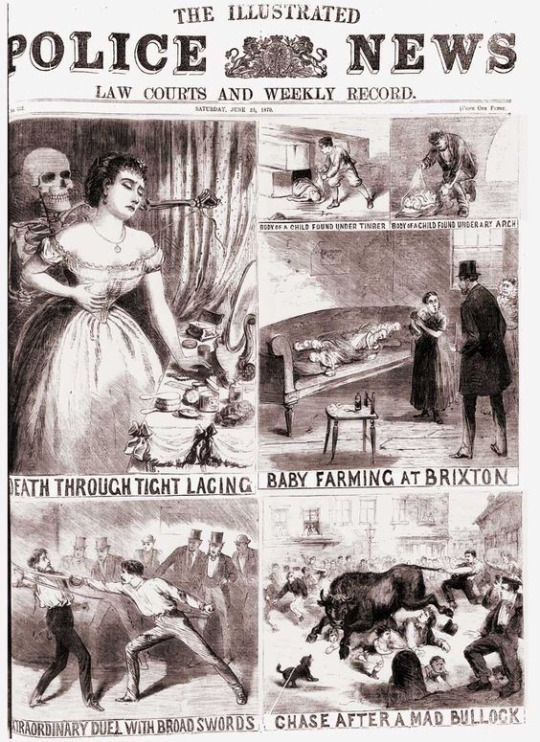
The most famous murderer of the era, was, of course, Jack the Ripper, which was just the orchestral climax of a hideously corrupted society that had bubbled into naught but a festering carbuncle, an ulcer upon the very soul of man, trussed up as a city of industry, but which is merely Salome, dancing with the Lamb’s head upon a platter and sending us all tumbling into a fiery pit.
....Ahem, again.
Some popular ways your fellow Victorians could kill you included: dueling (with swords but usually with revolvers), stabbing, garroting, and, probably the most popular method of the era, poisoning.
Speaking of which...
4. Anything dyed that hip shade of green
In 1775, a guy named Carl Wilhelm Scheele invented a new shade of green, cleverly called Scheele’s green, and it instantly became a hit. Pretty soon, manufacturers and tailors were dyeing everything this color.

Look at it. Bright, airy. Calls to mind a fresh, spring meadow. (What’s that, you ask? Well, before the Industrial Revolution belched out black smoke onto absolutely everything, there were these things called plants and grass and they were all over the place and you could frolic through them and it was very nice for your serotonin levels.)
I mean, listen, this isn’t really my color because anything vaguely yellow-ish makes my already yellow-ish skin look especially jaundiced, but it’s a lovely shade:

Besides using it to create beautiful dresses and tasteful waistcoats, they used it inside book covers:

And it was a super popular wallpaper color:

They had green candles and green cups and green kitchenwares and green paint.
But while Carl Wilhelm Scheele didn’t exactly murder anyone (even though he has three names like every serial killer ever), he sort of, accidentally, indirectly, kinda...did.
Because that springy dye contained every Victorian black widow’s favorite method to dispose of a troublesome husband: arsenic.
Scheele, of course, had no idea--no one did--so I’m fully exonerating him here, but the poison nonetheless started to take its toll.
Reports began to surface of kids getting sicker and sicker and then dying in their green wallpapered rooms; of fashionable ladies rocking those green dresses at balls and then ALSO getting sicker and sicker and breaking out in horrible sores before dying.
They even used this stuff to dye food green, so of course, anybody who tucked into Victorian green eggs and ham also, you know. Died.
And if they DIDN’T die, they got cancer, because if arsenic doesn’t kill you, it will give you cancer. And then kill you.
Eventually, as science advanced and went, “HEYO, there’s literal poison in this stuff,” consumers were like, “Well, shoot, this summer’s hottest beach shade just killed an entire boarding school,” and Scheele’s green finally fell out of favor.
It was, however, used as a pesticide up through the 1930s, so...way to use the...leftovers? I guess?
3. Your canned food
Hey, now that we’re on the topic of deadly chemicals being where they absolutely should not be, let’s talk about canned food.
In the Victorian era, it was the new Hot Thing (next to arsenic green). You mean I can can my food now? Like? Forever? Oh, only for a few months. Okay, cool. Still cool.
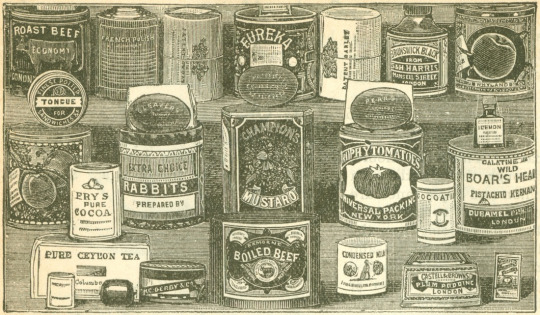
Above: Road trip snax.
Food preservation methods had existed long before canned meats and veggies and soups, but canned everything really started to gain traction around the middle of the 19th century, and people were stoked. Remember, the population exploded; people needed new methods of obtaining cheap food that didn’t spoil immediately. So: cans to the rescue!
Recycling hadn’t really been invented, though, so today, archaeologists constantly find giant Victorian trash pits filled with empty cans.
You know what also hadn’t been invented? Consumer health and safety boards.
So guess what was in the tin cans themselves?
No, no, don’t worry, it wasn’t arsenic.
It was lead.
Which, in case you weren’t aware, is also very, very bad for you.
So bad, in fact, that today, scientists are pretty sure lead-lined tins of canned food were partially responsible for the deaths on the disastrous Franklin Expedition, an ultimately futile trip to discover the Northwest Passage lead by Sir John Franklin in 1845. Every single man on board the two ships stranded in the Arctic died, and in the 1980s, when scientists discovered perfectly mummified bodies (GRAPHIC, if you don’t like that sort of thing, but awesome if you do) of some of the sailors, one of the mummies contained insane amounts of lead. They later tested the cans found scattered across the wreck site and whoops, they also contained insane amounts of lead.

Above: Some of the tin cans from the Franklin Expedition, which contained items like salted beef, vegetables, tea, lethal amounts of lead, and Chicken of the Sea.
Granted, other factors contributed to the Franklin deaths, like, you know, being stranded in the Arctic and starving to death, and also tuberculosis, but lead-lined canned food certainly didn’t help things along.
2. Your doctor
Here’s my advice if you’re in the Victorian era and you’re starting to feel sick: do not get sick. Just don’t. Because then that means you’ll have to go to the doctor. Which probably means you will die.
Hospitals in the 19th century were deadly. Often even more deadly than just staying at home, according to Dr. Lindsey Fitzharris, author of The Butchering Art. Nobody knew how to treat anything, really, because medical understanding of biology was in its infancy and antibiotics didn’t exist yet, so you were absolutely, definitely going to get some kind of infection the second you stepped foot in a Victorian hospital.
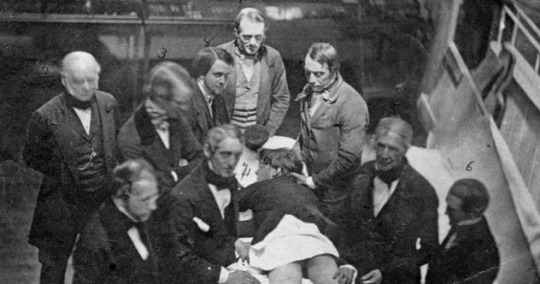
Above: The surgery, where nobody has any idea what they are doing, ever.
Doctors weren’t trying to kill you on purpose--they just didn’t know any better. And it super duper didn’t help that common treatments for everything from the common cold to tuberculosis included taking mercury (which kills you) and blood-letting, (which can also kill you) the tools for which are shown below:
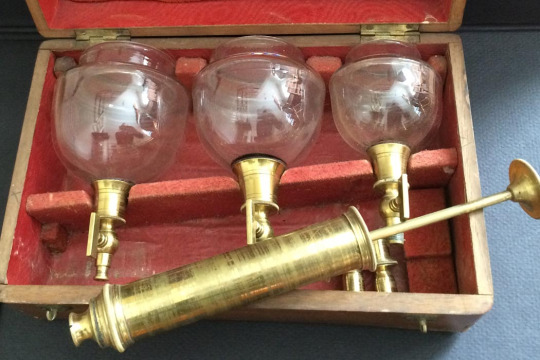
Those might look like fun doodads for your astronomy class at Hogwarts, but they’re actually vials and a really, really sharp needle that pricks you until you bleed out a critically dangerous amount of blood into those vials.
The (ancient) school of thought behind blood-letting was that draining patients of “bad” blood would rebalance their “humours” and get rid of the icky thing that was making them sick. We might laugh at it now, but if you don’t know any better, logically, it makes sense.
Medically, oh my God, it’s the worst.
So if Doc didn’t bleed you to death, he might try surgery--done without anesthesia or antibiotics (until good old Dr. Lister came along--read The Butchering Art!), and then ship you and your amputated stump leg off to the hospital ward where, instead of healing, you’d get wheeled through hallways stained with every bodily fluid imaginable into rooms filled with people coughing up every bodily fluid imaginable, some of which would get into your leg stump, infect it, and then kill you dead.
��But what about medicine?” you ask. “Can’t I just take medicine?”
Sure! Just be aware that it definitely contains morphine and probably contains cocaine, or mercury, or arsenic, or sulfur, or pulverized bits of ancient Egyptian mummies (I am not kidding. True, the latter had started to fall out of favor in the 19th century, but, like. Stop).

Above: Hard drugs, but just for you.
You think I’m joking?

Above: PARTY TIME.
Sometimes, a doctor would just advise that you move to a “more temperate climate” like Rome or Spain if you were feeling chronically ill, which might help you get a tan and COULD help if you had sucky lungs, but eventually, you’d just die anyway, because what you really needed was a strong antibiotic or antiviral medication and the closest you were gonna get was Mrs. Hopplebopple’s Temperance Tonic, which was probably filled with ground up baby bones and just so much heroin.
And don’t even get me started on Victorian surgical tools:
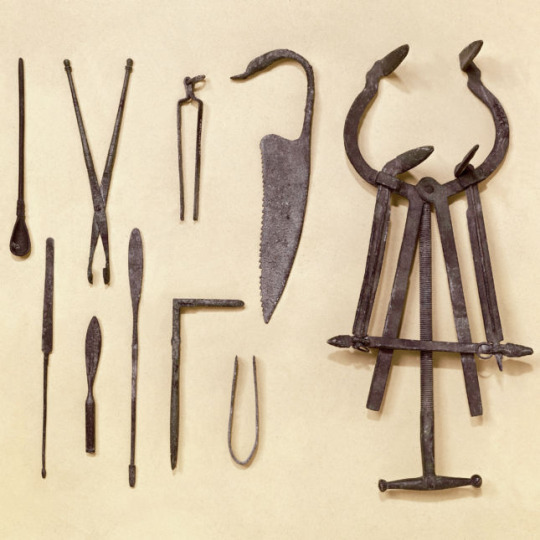
Open wide.
1. Water
There are three rules in this life: don’t watch any Adam Sandler movies except for maybe Anger Management, don’t eat the yellow snow, and do not, ever, for any reason, ever drink water in Victorian England.
That’s because it was about as clean as a Victorian hospital.
Meaning it wasn’t. At all.
Victorian water--of the Thames variety--contained:
Cholera, one of the deadliest killers of the era and bad water’s favorite roommate.
Poop, human and otherwise, because a functioning sewer system? I don’t know her. (At least, not until the 1860s.)
Pee, human and otherwise, because nothing says, “Jolly Old England” like an open trench of piss rolling through the city.
Dead things, like animals, fish (which are animals, so why am I listing them as a separate thing?), and, occasionally, humans.
Chemicals, which spewed forth from the great factories in billowing, bubbling, belching rivers of sludge. (Ha! Omg, yes, I was an English major!)
The Thames was so filthy that Londoners called it “Monster Soup.”

Above: Same.
In 1855, scientist Michael Faraday (who was also kind of hot; tell me I’m wrong), wrote a letter to the Times about the disgusting state of the river:
"Near the bridges the feculence rolled up in clouds so dense that they were visible at the surface, even in water of this kind. ... The smell was very bad, and common to the whole of the water; it was the same as that which now comes up from the gully-holes in the streets; the whole river was for the time a real sewer."
Tl;dr: “It smelled like ass.”
In fact, it got so bad, so putrid, so horrifically clogged with every disgusting thing your mind and your butthole can possibly conjure up, that it lead to one of my favorite things to read about in the world: The Great Stink of 1858.
Yes, that’s the real name. I did not make that up. History is incredible.

Above: Summer vacation, 1858.
The summer of 1858 was miserably hot in London. And the Thames was miserably clogged with poop, and pee, and chemicals, and dead things, and, uh oh, cholera. During July and August that year, the smell wafting from the river was so offensive that Parliament was actually adjourned because everybody kept throwing up. Cholera devastated the city. The water was killing London.
Faced with either the prospect of living with a city-wide vomit-and-diarrhea smell for the rest of forever OR finally cleaning things up, the government actually did something right and chose the latter. They contracted civil engineer Joseph Bazalgette to overhaul the city’s sewer, to which Bazalgette, pinching his nose, responded, “FINALLY.”
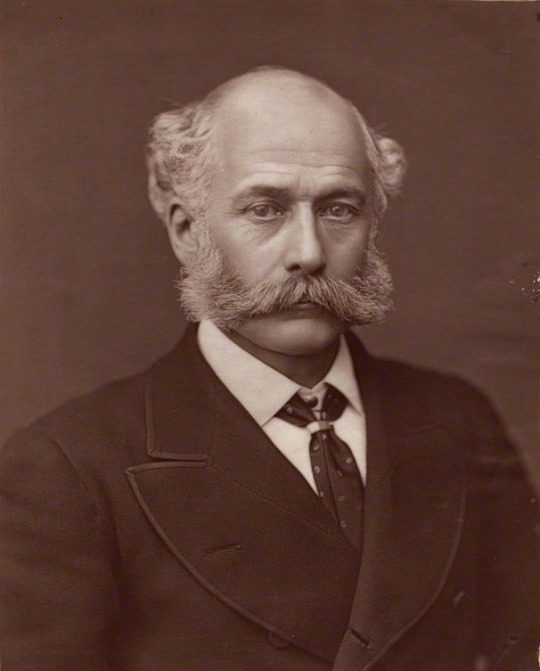
Above: Joesph Bazalgette, savior of the London sewers and purveyor of a truly beautiful mustache.
Bazalgette proceeded to build the London sewer system still in use today. His efforts greatly reduced the number of cholera deaths, cleared the Thames of its Cronenberg-esque muck, and ensured that poop goes where it’s supposed to: way the hell out of HERE and way the hell under THERE.
Water sanitation still had a long way to go, though, which meant you either had to boil your water to kill the bacteria in it, or you could just drink alcohol instead, which was the safer option but which would also leave you very dehydrated and also, if imbibed excessively, would leave you very dead.
So really, you were doomed in some way no matter what you did, and if that isn’t the moral of the entire Victorian story, then I don’t know what is.
2K notes
·
View notes
Text
random dracula reread notes
god this book is even better than I remembered
I mean, obviously it has some of the usual nastiness one would expect from a 19th century novel written by a white man, but on the whole... what a good book
like, it’s the Power of Friendship™. All the main protagonists genuinely love each other and hold hands all the time and let each other cry on their shoulder and kiss and make sure their friends get enough sleep. Dracula stood no chance against that
Jonathan Harker describing everything he had for dinner and making notes to ask for the recipes later is the cutest shit
never forget that Dracula had to clean and cook for Jonathan himself to make it seem as if there were servants in the castle
never forget Dracula’s straw hat “which suit not him or the time”
the first time I read this novel translated into Latvian, and now I am trying really hard to remember if that translation captured Van Helsing’s characteristic English-is-not-my-native-language manner of speech. I should also check the Russian translation at some point to see how it deals with this aspect
I want to be Mina Harker when I grow up and yes I know that presently I must be older than she is in the book
the dynamic between Jack and Van Helsing is so much fun because, on the one hand, Van Helsing respects Jack a lot as a fellow scientist and as someone who had saved his life, but he also pulls Jack by the ear when he’s being dense and tells Lucy something like “oh he doesn’t understand girls!” when Jack is in the same room. He’s Jack’s colleague and mentor but also his embarrassing uncle. Amazing
actually Van Helsing’s dynamic with everyone is adorable, he just literally adopts them all
I have a mighty need for a prequel novel(s)/series about the “wandering days” of Jack, Quincey, and Arthur, because you can’t just say stuff like “We’ve told yarns by the camp-fire in the prairies; and dressed one another’s wounds after trying a landing at the Marquesas; and drunk healths on the shore of Titicaca” and not expect me to want to hear everything about that. “Do you remember, Art, when we had the pack after us at Tobolsk?” like what the fuck were you doing in Tobolsk in the first place, Quincey, I need to know
Jonathan/Mina are simply the best (and everyone who feels like we as a society need more depictions of wholesome and loving marriages should definitely check this book out), but my favourite love-related quote in this novel still is “and I love you with all the moods and tenses of the verb”, written by Mina to Lucy
Lucy! Lucy is a sweetheart, and while I think it is valid to read her as polyamorous, I feel the primary idea behind her saying she wishes she could just marry three men is that she felt awful knowing that she has to break the hearts of two wonderful men because she just doesn’t love them the way she loves the third one. On the other hand, everyone in this book seems a little in love with everyone else, so, like, valid regardless
I think I’ve said this before but I like how Jack is always a step away from becoming your typical Mad Victorian Scientist (he almost brought Renfield a cat just to see if he would really eat it - unethical, yeah, but interesting!) but he never makes that step because his heart is too kind. Also I think a lot about the way Lucy describes him in her letter to Mina as calm, resolute, and overall an excellent parti, and then we read his diary and it’s like “maybe if I overwork myself, my depression will go away, might also do some drugs for good measure”... somebody help him
Quincey’s proposal and what he said to Lucy after she refused him and basically everything he does in the book... can I marry him
also the only inaccuracy I sanction for the adaptations to come is letting him survive
I missed it somehow the first time I read this book but Van Helsing loves Arthur so much because he reminds him of his dead son... ouch
speaking of Arthur, I don’t hate him? Yes, he seems to have the least developed personality out of all the protagonists, but he also didn’t do anything wrong. Also it’s hilarious to me for some reason how one of his superpowers is summoning rat-catching dogs. He’s like a Victorian Pokemon trainer
imagine a horror movie focused solely on the voyage of the Demeter. Just this ship, its crew, and a vampire slowly destroying them one by one
I can’t believe Mina and Jonathan called their son after five men. FIVE MEN all those Albuses Severuses and Jameses Siriuses can’t compare
obviously now I want to watch some adaptation but also, based on what I’ve heard about most of these adaptations, I don’t want that. Help us Karyn Kusama you’re our only hope
#dracula#bram stoker#gella talks dracula#talk talk talk#the next logical step is to think about fancasts isn't it
58 notes
·
View notes
Text
TAFAKKUR: Part 360
THE SUB-ATOMIC WORLD AND CREATION
Out of the three famous papers that Albert Einstein published in 1905, On a Heuristic Point of View Concerning the Production and Transformation of Light explicitly stated the quantum hypothesis for electromagnetic radiation, and On the Movement of Small Particles Suspended in Stationary Liquids Required by the Molecular-Kinetic Theory of Heat developed the theory that led to the establishment of the sub-atomic nature of matter.
Following the classical Newtonian physics and under the spell of developments in science, physicists of the 19th century claimed that they could explain every phenomenon in the universe. E. Dubois Reymond, at a meeting held in memory of Leibniz in the Prussian Academy in 1880 was a bit humbler: 'There have remained eight enigmas in the universe, three of which we are unable to solve yet: The essential nature of matter and force, the essence and origin of movement and the nature of consciousness. The three of the rest that we can solve although with great difficulties are: The origin of life, the order in the universe and the apparent purpose for it and the origin of thought and language. As for the seventh, we can say nothing about it. It is the individual free will.
The sub-atomic world threw all scientists into confusion. This world and the 'quantum cosmology' which it introduces, rather than being a heap or assemblage of concrete things, is made up of five elements: the mass of the electron in the field where an action occurs (M), the mass of the proton (m), the electrical charge which these two elements carry, the energy quanta (h)-the amount of the energy remaining during the occurrence of the action-and the unchanging speed of light (c). These five elements of the universe can even be reduced to action or energy waves travelling through space in tiny packets or quanta. Since the quanta required for an action are special to it and exist independently of the quanta required for the previous action, it becomes impossible to predict the exact state of the universe. If the universe is in t1 state now, it cannot be predicted that it will be the same in t2 state. Paul Renteln, assistant professor of physics at California State University, writes: 'Modern physicists live in two different worlds. In one world we can predict the future position and momentum of a particle if we know its present position and momentum. This is the world of classical physics, including the physics described by Einstein's theory of gravity, the general theory of relativity. In the second world it is impossible to predict the exact position and momentum of a particle. This is the probabilistic, subatomic world of quantum mechanics. General relativity and quantum mechanics are the two great pillars that form the foundation of 20th-physics, and yet their precepts assume two different kinds of universe.' (American Scientist, Nov.-Dec, 1991, p.508)
The real nature of this sub-atomic world and the events taking place in it make it impossible to construct a theory to describe them, because they cannot be observed. One reason for their unobservability is that, as Renteln writes in an attempt to propose a theory which he calls quantum gravity to reconcile the two different worlds of classical and quantum physics, 'the events take place at a scale far smaller than any realm yet explored by experimental physics. It is only when particles approach to within about 10-35 meter that their gravitational interactions have to be described in the same quantum-mechanical terms that we adopt to understand the other forces of nature. This distance is 1024 times smaller than the diameter of an atom-which means that the characteristic scale of quantum gravity bears the same relation to the size of an atom as an atom bears to the size of the solar system. To probe such small distances would require a particle accelerator 1015 times more powerful than the proposed Superconducting Supercollider.'
At the outset of this century, electrons surrounding the nucleus of an atom were thought to orbit the nucleus like planets in a miniature solar system. However, later researches modified that view. The electron is now understood to be more of an energy field cloud fluctuating around a nucleus. The nucleus itself seemed to be composed of two smaller constituents-protons and neutrons. However, in the 1960s, physicists Murray Gell-Mann and George Zweig confirmed by experiments that protons and neutrons were made up of even more elementary particles, which Gell-Mann called 'quarks.'
Quarks cannot be seen, not just because they are too small but also because they do not seem to be quite 'all there.' Quarks are better described as swirls of dynamic energy, which means that solid matter is not, at its fundamental level, solid at all. Anything you hold in your hand and which seems solid, is really a quivering, shimmering, lacy lattice of energy, pulsating millions of times every second as billions of fundamental particles gyrate and spin in an eternal dance. At its most fundamental level, everything is energy held together by forces of incredible power. This is not all that makes us unable to predict even the nearest future of the universe. According to Werner Heisenberg's theories, at just the time when we can know either where a particle is or how fast it is travelling, we cannot know both. This is because the very act of measuring the particle alters its behaviour. Measuring the particle's speed changes its position, and measuring its position changes its speed.
However, the unpredictability in the sub-atomic world does not change anything in our everyday, predictable world. Everything works according to the basic laws of classical Newtonian physics. Why is this so and how should our view of the world and events be? Scientists who believe in the existence of God and His creation of the universe suggest that creation was not a single event. That is, God did not create the universe as a single act and then leave it to operate according to the laws He established. Rather, creation is a continuous act (creatio continua). In other words, roughly like the movement of energy or electricity and its illuminating our world by means of bulbs, existence continuously comes from God and returns to and perishes in Him. Through the manifestation of all His Names, God continuously creates, annihilates and re-creates the universe. Some medieval Muslim scholarly saints such as Muhy al-Din ibn al- 'Arabi and Mawlana Jalal al-Din al-Rumi called these pairs of acts as the continuous cycle of coming into existence and dying. Because of the incredible speed of this movement, the universe appears to be uniform and continuous. Rumi likens this to the fast spinning of a staff on one end of which there is fixed a light. When spun at speed, the light on the end of the staff appears as if a circle of light. Unable to explain the extreme complexity of existence and the events taking place, some scientists assert that everything is in chaos and attribute the formation of the universe as it is to mere chance. According to them, other universes could have formed, they simply did not, and there is no reason that the universe is the way it is. Given that it is impossible for even three or more unconscious things moving at random to come together by themselves to form even the simplest entity, it is highly questionable whether a rational person can accept that the wonderful order prevailing in the universe according to which we can direct our lives can be explained without attributing it to a supernatural intellect. A. Cressy Morrison writes:
The proverbial penny may turn up heads ten time running and the chance of an eleventh is not expected but is still one in two, but the chance of a run of ten heads is very small. Suppose you have a bag containing one hundred marbles, ninety-nine black and one white. Shake the bag and let out one. The chance that the first marble out is the white one is exactly one in one hundred. Now put the marbles back and start over again. The chance of the white coming out is still one in a hundred, but the chance of the white coming out first twice in succession is one in ten thousand. Now try a third time, and the chance of the white coming out three times in succession is one hundred times ten thousand or one in a billion. Try another time or two and the figures become astronomical. The results of chance are as closely bound by law as the fact that two and two make four. All the nearly exact requirements of life could not be brought about on one planet at one time by chance. The size of the earth, the distance from the sun, the thickness of the earth's crust, the quantity of water, the amount of carbon dioxide, the volume of nitrogen, the emergence of man and his survival-all point to order out of chaos, to design and purpose, and to the fact that, according to the inexorable laws of mathematics, all these could not occur by chance simultaneously on one planet once in a billion times. It could so occur, but it did not so occur. (Man Does Not Stand Alone, New York, pp.98-9.)
Attributing the impossible to chance is a trick of the human mind, its stubborn resistance, which confuses a theoretical possibility with the actual facts. For example, it is possible that the Pacific Ocean has now changed into milk, but actually it has not. As it is impossible to construct a building on a flowing stream, God Almighty spread over the unpredictability of the sub-atomic world the veil of the speed of its movement and made the universe dependent on what we call laws. It is for this reason that everything in the outer face of nature works according to the basic laws of classical Newtonian physics. However, it is a matter of controversy between the two schools of Ahl al-Sunna wa 'l-Jama'a whether the universe has a continuous existence working according to established laws and things accordingly have perpetual properties or God continuously creates the universe and orders each component of it what to do at every moment. The followers of the Maturidi School assert that God created the universe and set it to operate according to certain laws which He established, giving each thing certain properties. For example, fire burns because God gave it the quality of burning. Whereas, the followers of the Ash'ari School maintain that the universe does not have a perpetual, established existence and reality. Nor do things have essential qualities of themselves. God creates the universe anew each 'moment' and directs it continuously by ordering each thing to do what it must do. For example, fire does not essentially have the quality of burning, rather, God gives it the order to burn and it burns. Since according to the dictates of life in the universe, He usually orders it to burn, we think that fire essentially has the quality of burning.
As we accept the 'relative' truth of both Newtonian and quantum physics at the same time, we can also accept the truth of the views of both schools of Muslim faith. As a matter of belief and as life at the most fundamental level of existence as in the sub-atomic world points out, God is continuously active, creating the universe anew and directly administering it. While at practical level, life will be impossible for us if we do not accept or assume the uniform continuity or stability of existence. What would life be if we were conscious that the sun would not rise tomorrow morning or that we might not live a second longer, although it is theoretically conceivable both that the sun might not rise tomorrow and that we might not survive a second longer?
#allah#god#prophet#Muhammad#quran#ayah#sunnah#hadith#islam#muslim#muslimah#hijab#help#revert#convert#dua#salah#pray#prayer#welcome to islam#how to convert to islam#new muslim#new convert#new revert#revert help#convert help#islam help#muslim help#religion#reminder
4 notes
·
View notes
Text
I See What You Did There
What’s two plus two?
Huh? What? What’s happening?
What’s two plus two?
Oh, shit, right, I have a book review blog, don’t I? I mean, things have been a bit hectic these past few months and I’m also trying to be a real writer...
What’s two plus two?
Yeah, you’re right, I shouldn’t neglect my tumblr, even if nobody reads it. And come on, computer, it’s not like I’ve been in a coma for four years, two plus two is clearly five and we all love Big Brother, OK? Gah.

Uhhh...And by that, I mean: Project Hail Mary by Andy Weir!
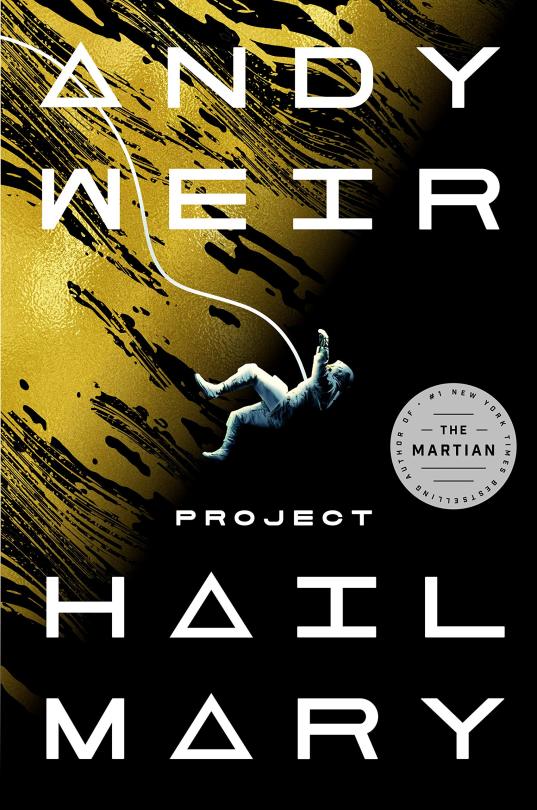
Dr. Ryland Grace wakes up in a spaceship with no memory of how or why he’s there. He’s a junior high school science teacher, what the hell is he doing on a spaceship? Also, the other two astronauts are dead. Like, really dead. So far as how things are going for Dr. Grace right now, I’ll let Pete Campbell give you a hint:

Slowly, veeeery slowly, Grace’s memory starts to come back to him: he’s on a mission to save the Earth. There’s this nasty space bacteria-thingy called Astrophage that’s dimming the light of Mr. Burns’s archnemesis: the Sun.

There’s a lot of science involved, but Weir explains, in great detail, just how Astrophage dims the Sun and why that’s really, really, really, really bad for the Earth. Like, apocalyptic-bad. Billions will die bad. Famine, disease, war, rocks fall, everyone dies and freezes to death bad. Only not right away. Over the course of several years. So everyone will die, but they’ll get to do it real slowly.
Yay?

Like so, but it ends with everybody dead and the Earth being rendered uninhabitable. All of Grace’s wee little students will grow up watching their Earth slowly die. Unless Project Hail Mary finds a solution. And there seems to be a solution out there - Tau Ceti seems to be the only star not infected with Astrophage. Why? How? What? So this all powerful woman called Stratt, who has been given authority by just about everyone (how? Reasons. Don’t ask questions) yanks Grace out of his classroom - first to study Astrophage, and then, somehow, he can’t remember exactly, roped him into going on a dozen-light-year journey to Tau Ceti with the crew of the Hail Mary.
Only the rest of the crew is dead. Something went wrong while they were in a coma during their four-year space voyage. Grace is alone.
Inside the Hail Mary.
Full of a dude called Grace.

I see what you did there, Weir. Don’t think I didn’t see what you did there. I mean, you don’t even have to be Catholic to see what you did there.

Anyway, long-winded flashbacks and lots of science ensues. I struggled with the first quarter of the book - not for any particular reason other than I started reading this book in the latter half of 2020 and I was having a hell of a time concentrating on...well, everything. Remember 2020? Yeah, it wasn’t great. I mean, I’d need a lot of “not great, Bob!” gifs to describe just how bad those last few months of 2020 were.
And then I thought 2021 would be better. Ahahaha we barely made it six days. Seriously, everything is terrible and how do I even concentrate on a dumb book blog let alone a book all about science and the Earth slowly dying because the sun is dimming and -

Soon enough, however, Grace spots something on the Hail Mary’s radar. It’s...another spaceship? All the way out by Tau Ceti? At first, Grace thinks maybe its another ship from Earth, like a backup plan, that’d make sense, right? Only it’s not.
Who could it be?
Aliens?
Yeah, it’s aliens.

Our friend Grace gets to be the dude to make first contact with the sentient, spider-like creatures of the first planet in the system 40 Eridani. Turns out 40 Eridani is also infected with Astrophage, which is causing all sorts of problems for the Eridians, and their ship just happened to be around Tau Ceti at the exact same time as the Hail Mary. Crazy, right? Anyway, after the initial first contact and the long, drawn-out process of learning to communicate with one another (with no help from Amy Adams or Jeremy Renner), Grace and the lone Eridian, whom Grace christens Rocky, team up to save their respective worlds.
Science and plenty of flashbacks ensue.
I’m not a scientist - well, I have a master’s degree in library and information science, which, I guess, is a science? I mean, uh...I could tell you where all the sciency books are in the library. 500s if you’re using Dewey, and if you’re using Library of Congress, it will depend on what you’re looking for - you’ll want to start with Q for general sciences, QA for math books, QB and QC for astronomy and physics, QE, GC, GB, QC, TN for earth sciences, QD, TN, TP, and TR for chemical sciences, GE and bits of GF, QE, QH, QC, and TD for environmental sciences, QH, QK, QL, QM, QP, and QR for life sciences, QA75-76.9, TK5101-TK6720, TK7800-TK7895, and Q334-Q390 for computer sciences, telecommunication and artificial intelligence, Q, R, S, and T for the history of sciences and if you’re looking for bibliographies and finding aids for topics in the sciences, look under Z.
You know. Science.

OK, so I may not be a scientist. I may be bad at math because numbers somehow magically switch themselves around on paper whenever I look at them. Why? Because my brain sucks, that’s why. I may have spent most of my chemistry classes reading YA books under my desk (worth it!). I may have only passed high school physics by cheating off a girl younger than I was, but hey, the joke was on me: my high school physics teacher wasn’t even qualified to teach physics.
Gotta love rural public schools.
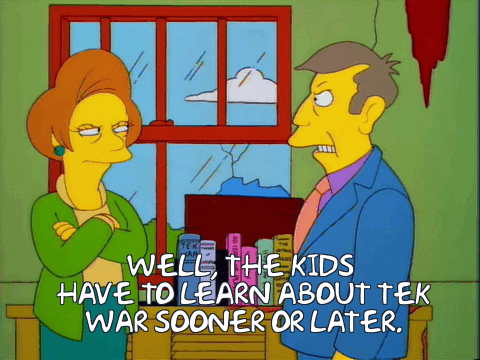
My point is, while the science may be lost on me and my brain which is full mostly of Simpsons quotes rather than actual knowledge, I do loves me a fun story where Science (with a capital S) saves the day. And, make no mistake, this book is fun. You might get a bit bogged down by the science, but once you get past it, this is a highly enjoyable story of one dangerously unqualified guy desperately trying to save the world with his new BFF, alien spider guy who speaks in musical notes. It’s up to them and them alone. Good luck, guys! Don’t forget that billions upon billions of lives depend on you. No pressure.
Seriously, if you loved The Martian, you’ll love Project Hail Mary. They’re similar, but Hail Mary is on a much larger scale than The Martian - there’s a lot more at stake in the hands of one guy. Plus: aliens!
Without spoiling anything, I’ll just say I would have loved more from the ending. I would’ve loved an epilogue from some of the other character’s perspectives or something. I mean, I could even go with a sequel! Maybe something where Erid and Earth are finally able to communicate? There’s a lot of potential for short stories or novellas set in the same world as Project Hail Mary - there’s got to be bonus material there and I want it. More, please? That’d be nice. I’d definitely read it. So... Hop to it, Weir!
One last complaint: Grace doesn’t swear. Like, at all. Meanwhile, Mark Watney is over here like

Come on, Grace, would it kill you to say “fuck” or “shit” every now and again? I mean, I sipped coffee that was too hot and let out a bunch of words that’d make a 19th century whaler blush. Geez.
RECOMMENDED FOR: Fans of The Martian, science-y people, people who enjoy a heavy dose of science in their sci-fi, people who just want a fun story
NOT RECOMMENDED FOR: People with no mind for science, people who are against fun, anyone who doesn’t like sci-fi, aliens, fun, etc.
RATING: 4/5
ALIEN RATING:
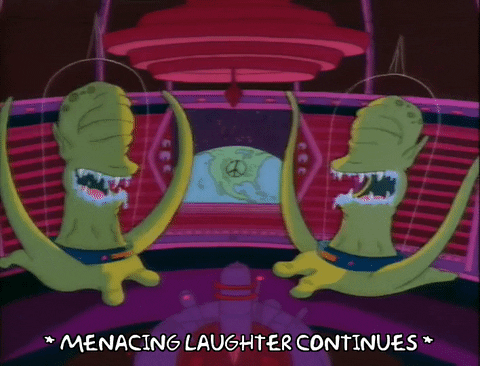
RELEASE DATE: May 4, 2021 (HEY! Don’t think I didn’t see what you did there, too, Ballantine Books!)

ANTICIPATION LEVEL FOR SPINOFFS / SEQUELS / BONUS MATERIAL OF ANY KIND: Olympus Mons.
DID I SEE WHAT YOU DID THERE?
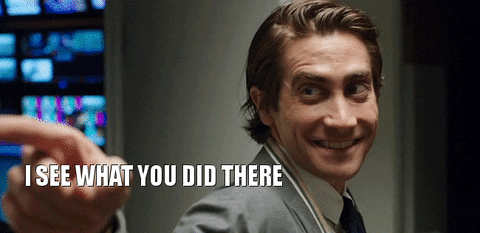
#project hail mary#andy weir#fiction#book review#science fiction#hard science fiction#sff#sci-fi#tau ceti#rocky#adrian#hail mary#ryland grace#apocalyptic fiction#first contact#aliens#global dimming#astrophage
9 notes
·
View notes
Text
Let us now turn to some contradictions and ironies inherent in postmodern thought.
The first irony that strikes me is its great popularity in countries like India and China. All the fundamental presuppositions of postmodern social and economic analyses refer to the structures of advanced capitalism. Looking at things from India, it seems implausible that postmodernist analyses could apply to societies that are not modern even by the standards of 19th century Britain or France or Germany. Nor is it possible to be postindustrial in predominantly agrarian societies.
Definitive decline of the industrial working class is a central tenet of postmodernism. This too does not apply. Given the demographic size of China and its rapid industrialization in recent years, there has been greater expansion of the industrial proletariat there in mere three decades than perhaps in all of Europe during its industrial revolutions. A small number of countries - East and South East Asian countries, plus India, Brazil and Argentina, let us say - has experienced a demographically much larger process of proletarianisation than the West did in all its history, and this has happened precisely during the half century which has witnessed the ascendancy of postmodern ideas in the higher echelons of university education.
As for the great prosperity and generalised ownership of housing and consumer durables that capitalism is said to have delivered, the fact is that (a) the vast majority of people outside the Euro-American zones never experienced anything of the kind, and (b) that kind of prosperity, including homeownership for the working classes, is precisely what is getting dissolved by the current offensives of the capitalist class across Europe and North America. And if the credit system was the great motor for the making of the ‘consumer society’, ‘affluent society’ etc, it is precisely the scale of private and state debts that is bringing that whole phase of American prosperity to a close under our very eyes.
We shall ignore here the absurd idea of the disappearance of the capitalist class in the United States. But something needs to be said about the opposite thesis, regarding the working class. I have already pointed out the actual and historically unprecedented expansion of the proletariat in numerous Third World countries over the past half century. Moreover, the dramatic decline of the industrial working class in the US is an index of the general decline of manufacture in US economy as such, and this decline is proving to be not a sign of prosperity but the key cause of the decline of American economic power as such. That is certainly not the case in the most powerful European economy, namely Germany, where industrial working class continues to have far greater social weight. In another frame, as early as the 1970s, when ideas of the death of the working class were swirling around on both sides of the Atlantic, Harry Braverman, in his brilliant book Labour and Monopoly Capital, had demonstrated that some 90% of the US population owned no income-generating property and relied exclusively on an economy of salaries and wages. A sectoral breakdown of jobs and incomes then showed a very high degree of proletarianisation.
Meanwhile, since at least the advent of Lenin, communists have never believed that the industrial working class will necessarily become the majority of the population or the exclusive agent of revolutionary change; nor has it been postulated that the industrial working class is the only kind of working class we have. The proletariat has always been conceived of as the leading nucleus of a revolutionary movement which will, however, necessarily rely on mobilization of and joint action with other oppressed classes, such as the peasantry, the rural proletariat and the mass of workers in branches other than manufacture, not to speak of numerous other social strata. The postmodernist idea that communism has somehow become irrelevant because the industrial proletariat constitutes only a minority of the population - and even of the proletarianised masses - thus has no bearing on how the role of the industrial proletariat is actually conceived in communist thought.
We can thus say that so far as the social and economic analyses of postmodernism are concerned, we can treat this part of the ideology essentially as a reflection of a particular phase of western, especially US, prosperity, with the assumption that this particular kind of prosperity will now be permanent. Moreover, the ideology is quite an accurate reflection of the class location of the new and prosperous middle class which itself a product of the type of capitalism that arose in the imperialist core of contemporary capitalism during the ‘Golden Age of Capitalism’ between 1945 and 1973. This class has actually continued to gain during the whole period of the Bubble Economy that speculative capital was able to sustain even after the recessionary trends set in after 1973. Moreover, key producers of such ideologies tend to be concentrated, even when they come from Third World origins, in institutions of higher learning and cultural management in those countries. This highly Westocentric ideology was presented, moreover, as a universalism, i.e., as if conditions prevailing in the West were somehow global conditions and ideas produced in specific circumstances had universal validity.
[...]
About Foucault I shall be brief. He is more a philosophical historian and little concerned with active politics. He was as opposed to the fundamentals of Marxist thought as Lyotard but had absolutely no truck with neoliberalism. His opposition to Marxism can be illustrated with a brief but paradigmatic formulation of his difference from Marxism: ‘no narrative of history can be assembled from the twin sites of political economy and the state.’ What does this mean? First, classes are not the fundamental units of society; economic power is just one kind among many kinds of power; the state is just one social actor among many other kinds of actors; to abolish one kind of state (e.g., the capitalist state) and replacing it with some other kind of state (e.g., the proletarian state) amounts to no more than replacing one kind of power over the people with another kind of power. Second, society is composed of countless complexes and organisms of power: the family, the prison complex, the schooling complex, the medical complex, the technologies for management of sexuality, and so on and on and on. Each has to be addressed in its own terms, not in the overall framework of class struggle.
Such ideas then lead to a very restricted notion of what forms of politics might be permissible. One of Foucault’s key political ideas is that no one can really represent any one else without a coercive relationship with those who are represented. All you can do in the social domain is try to help enhance the power of people to represent themselves. For this you need what Foucault calls ‘micro-politics,’ local, issue-based, time-bound. You help others if you can but you make sure that you don’t try to represent them, since self-representation is the only authentic form of representation.
Foucault’s idea of ‘micro-politics’, local and issue-based, and especially the rhetoric of ‘empowering’ without organizing politically, does authorize the kind of politics that has come to be practised now on such a vast scale by the NGOs and the so-called social movements. His proposition that (a) every society is composed of countless centres of power and great many institutions, and therefore (b) what is required is not a unified political party but a whole plethora of agents addressing those multiple centres of power resonates well with the very structure of the postmodern politics that have arisen in our times, especially in the form of identity politics. And, for all its radical claims, this kind of politics is perfectly acceptable to Anglo-Saxon liberal statecraft which has always understood that capitalist state power is safest when it can fragment the opposition into diverse claimants competing for a share in the national revenue - atomisation of politics, so to speak - and most vulnerable when it has to face a united opposition to its rule. In immigrant societies such as the United States, where the population itself is composed of diverse social groups-distinguished by countries of origin, religious affiliation, racial divides etc--this atomisation of politics in the shape of ‘identity politics’ has always been the principal weapon against class politics, as Marxist historians such as Mike Davis have shown with extensive documentation. By the end of 1960s, this politics of ethnic identity became state policy not only in the US but also in Canada as ‘multiculturalism’ and in Britain as ‘race relations’--increasingly with the high philosophical rhetoric borrowed from French postmodernism. This Anglo-Saxon manoeuvre was then imported into India, often with postmodernist authority; even the word ‘ethnicity’ was a gift to Indian social science from the Ford Foundation and its funded scholars, institutes, publications and seminars. Until the 1970s, hardly any Indian social scientist used this word.
[...]
Let us recall some of the features of American and French postmodernisms we discussed earlier. First, there is a revolt against Enlightenment ideas of Rationality, Universality and Progress. Second, in political theory, there is widespread rejection of the state and political organizations - parties, trade unions etc - as mere bureaucratic machines for mass coercion. Politics, then, can only be local, community-based and issue-based. The Nazi death camps and technologically produced weapons of mass destruction are cited again and again to debunk the idea that Science can be an instrument of human emancipation. Most of the postmodernists equate communism and fascism as ‘totalitarian’ ideologies and systems, borrowing this equation from the Far Right. Rejection of Modernity then often leads to a certain romanticization of thepremodern - the traditional, the primordial - as something authentic (Foucault, for instance, not only debunked communism as ‘totalitarian’ but also wrote essays praising the clerical revolution in Iran). Versions of all this re-appear in various shades of Indian postmodernism - as we shall see below.
The postmodern political forms in India typically take the shape of ‘social movements’, ‘civil society organizations’ and the funded NGOs. It is important to understand these terms. ‘Social movement’ is contrasted to ‘political movements’. Politics addresses the issue of state power, but if state is dismissed as realm of corruption and bureaucratic manipulation then political parties--even workers’ parties which participate in the political field and fight for state power--are also seen as part of that corruption, as yet other kinds of bureaucratic machines. Logically, then, the political is replaced by ‘the social’; the objective now is not to work toward a different kind of state power but to bypass the issue of political power altogether, and to work, in stead, for ‘empowerment’ of individuals, local communities and social groups where they exist, in relation to the specific issues that concern them in their daily lives. The same applies to the concept of ‘civil society organizations’. ‘Civil society’ is equated with ‘the people’ and is differentiated from ‘the state.’ Another term for the same is ‘people’s movements’. All of these typically take the form of the NGO. Much is made of NOT taking state funds, which is said to guarantee independence from the state. This is an interesting claim considering that great many of the most successful NGOs do take money from the Scandinavian governments, German foundations, various institutions of the United Nations, or such entities as Action Aid which is itself an arm of the British government - and for some years, increasingly, the World Bank, Ford Foundation etc. More recently, a number of Indian corporate houses have also moved into this field of patronage for NGOs. In practice, then, the national Indian state is the one that is treated as particularly unworthy, while funding from virtually anywhere else is considered clean.
Now, local work, among particular communities and on specific issues, is as old as 19th century reform movements, and most political parties which have any kind of ideological claims do have such programmes. But all such works was historically done with the idea of building larger and larger unities and organization for emancipation of the nation as a whole, of the peasantry and the working classes as entire social units, or of women on the national scale. What was new with NGOs etc was an exclusive emphasis on local work and the small group, with great contempt for electoral politics and with deliberate refusal to work in terms of classes, national liberation, or even trade union work. The phenomenon of the NGOs--many of whom starting calling themselves ‘social movements’ etc - arose in India as a major, distinct phenomenon when European social democratic parties - with their governments and foundations - began funding such organisations, essentially to compete with communist organizational efforts among the peasantry, the working classes, women and artisanal groups. On the global scale, those social democratic parties were already closely aligned with US imperialism since the beginning of the Cold War but much of the broad left in India which was opposed to the communist parties came to see those very social democratic parties as a progressive, democratic alternative to communism. There is reason to believe that CIA money was also funnelled through those European parties but the anticommunist projects of those parties themselves were now just as extreme as those of US imperialism. They funded anti-communist NGOs not only in India but across Asia and, especially, Africa.
Once that breach was in place, other funders could also move in. This phenomenon remained relatively restricted during the period when ideologies of anti-imperialism, economic nationalism and independent Indian development were strong and, rhetorically at least, the state itself paid lip service to such ideologies. As neoliberalism took hold and those ideologies receded, inhibition about getting funding from foreign agencies and domestic corporates also fell off. Then, as the state started withdrawing from direct involvement in providing social entitlements, it also began farming out some of its own work to NGOs, as had previously been done in weaker states such as Bangladesh. Over time, these ‘social movements’, armed with the rhetoric of ‘micro-politics’ borrowed from French postmodernism have come to occupy more and more of the political space in the name of ‘civil society’ and ‘the social’. This atomization of politics, which undercuts the politics of organized unity against the ruling class and its state, is greatly favoured by global capital itself.
[...]
In an article published in 1993, Dipesh Chakrabarty ascribed this great change in the very nature of the original subalternist project to, in his words, ‘the interest that Gayatri Spivak and, following her, Edward Said took in the project.’ Having thus identified the main influences behind the mutation, he also identifies the precise nature of the shift: from the project to ‘write ‘better’ Marxist histories,’ free of ‘economistic class reductionism’ to an understanding that ‘a critique of this nature could hardly afford to ignore the problem of universalism/Eurocentrism that was inherent in Marxist thought itself.’ This is a significant formulation, since it suggests that subalternism rejected the fundamentals of Marxism not once but twice. In the original project itself, Chakrabarty says, Subalternism rejected what he calls ‘economistic class reductionism’ - in other words, it rejected the idea that (1) that economy was the backbone of any society, (2) that the classes that are fundamental to the working of a capitalist system are the fundamental social forces of that society, (3) the idea that class struggle is the motivating force of history around which other kinds of struggles are shaped, and (4) the idea of the proletarian revolution itself. These are the ideas that are here described as ‘economistic class reductionism,’ which, Chakrabarty says, subalternism rejected at the very beginning. In the second phase, after American postmodernism - represented in this case by Said and Spivak - blessed the project, subalternism also rejected Marxist thought for its ‘universalism.’ Here, ‘universalism’ is again a code word for a number of ideas that are sought to be rejected, such as the idea (1) that there is a common humanity, beyond race or ethnicity or even nationality, which is exploited under capitalism, (2) that the proletariat cannot really emancipate itself without emancipating society as a whole and thus emerging (in Marx’s words) as ‘a universal class,’ (3) that what we have so far had is capitalist universality (my term for what the bourgeoisie calls ‘globalization’) and it cannot be overturned with anything less than a socialist revolution which itself will have to be, eventually, universal (global), and (4) that identities and ethnicities, important as they undoubtedly are, involve, in each instance, only a small part of humanity, whereas exploitation is what is ‘universal’ for the vast majority of humanity, beyond identity etc.
In short, then, rejection of what subalternists, in their code language, call ‘class reductionism’ and ‘universalism’ amounts in fact to rejection of Marxism as a whole, regardless of how often they invoke Gramsci or Mao or whoever.
This rejection of Marxism, coupled with growing identification with postmodernist ideas, and especially with postmodern antirationalism, then leads the subalterns to adopt positions on the issue of secularism and communalism, for instance, which are clearly rightwing even though they cannot be identified with Hindutva politics as such.
Aijaz Ahmad, On Postmodernism
25 notes
·
View notes
Note
I have a silly Napoleon ask for you: if he suddenly woke up in the present day what do you think he would a)like most about it b) like least about it c)get unreasonably addicted to d)decide to do for a living
hahah I’ve answered a similar one before here and here.
Most Like About It: A lot, I think. Central heating. Guys, he’d fucking love central heating.
In general, he’d love most technological advances. Cars, planes, trains etc. like he’d be very into that. “Bertrand we’re going to ride the TGV all day every day. Look at how fast we are going! This is genius.”
“Bertrand WE ARE IN THE SKY. This is AMAZING. We are going from Paris to Rome in a matter of HOURS. HOURS BERTRAND. WE DON’T HAVE TO CROSS MOUNTAINS.” (sorry just assuming this is exile Napoleon who woke up in modern day.)
Public transit in general - the metro, buses - anything that makes life more efficient for people. Dishwasher, washers/dryers, modern electricity, laptops, printers, ball point pens etc.
I suspect he’d be a big supporter of public health care and all the advances made on vaccines and medicine in general. 100% would hate anti-vaxxers. Pro-modern glasses (he’d get himself a pair asap. Then they’d explain contacts to him and I think he’d be like “WAIT NO, I WANT THOSE.” He would not be into lasik, I suspect).
Modern hygiene! Razors, tooth brushes, floss, moisturizer - general daily body care he’d probably be keen on. (All that stuff we take for granted.) Though maybe not all of it, he was quite traditional in certain things (his penchant for older fashion, par exemple). Maybe he’d keep the old straight razor shaving approach. But modern dentistry would be a huge improvement and I can’t see him being against it. Especially as someone who had a tooth extracted in the early 19th century.
‘Oh they give you pain killers now? Fantastic.’
‘Sir, we just numb the area where we are doing the work.’
‘So it doesn’t impede my awareness? Amazing. Please, fix all my teeth right now.’
He’d also support the greater access to education that exists, especially compared to his day. Also, streaming services. He would binge so many things. ‘Bertrand we are watching every thing this very soothing sounding British naturalist made about planet earth. Holy shit look at that they’re under water! They’re at the bottom of the ocean! Bertrand look at this. if only Josephine were here. She’d be so excited.’
Pro-zoom/Microsoft teams/facetime etc. 100%. ‘If I had this instead of people relying on my bad handwriting ...’
Oh, he’d like the EU as a concept. Except he would be very disappointed that France wasn’t at the helm. I think France’s position globally would disappoint him, overall. But yeah, the broad principles espoused by the concept of the European Union would appeal to him.
Brexit though. Lol. I think he’d enjoy watching England shoot itself in the foot. But if you asked him for his opinion, as in “do you think the UK should do this” he would answer no. They should remain.
He would like globalization, trade agreements, things like NAFTA, CETA etc. Supporter of big government. Reduction of religion in public sphere. Though would he be pro-banning visual manifestations of faith? (i.e. Hijab etc.) I don’t know. I doubt it. Simply because he was very focused on religion in government, so if churches aren’t involved in decision making, what citizens get up to on their own is their business (so long as you don’t cause problems). But I don’t know, he might be pro-it, because he was also into assimilation and creating a broad sense of a French culture. I could see him really going either way on it. It’d probably come down to whatever he thought would garner the most public support as a political move (since a lot of his more liberal moves as a leader were tied to understanding that marginalized communities would gun hard for him if he helped them).
He would be pro-mask wearing for COVID because he wasn’t a fucking idiot and lived in a time when pandemics were still a real going concern.
He would also probably like how comfortable modern clothing is. I don’t think he’d like how cheap and made-to-wear-out that most brands are, but he’d like the over all philosophy. Like Napoleon would dig t-shirts. Lounge wear. The fact that jeans have some stretch in them. That sort of thing.
--
Least Like: I think he’d be very wary of the internet. For many reasons. For the lack of government control (Napoleon “What is a free press? never heard of her” Bonaparte). But also, because of the misinformation problems. The side effects many of us are now bearing witness to, and experiencing the ramifications of.
He would dislike the whole fake news nonsense. Oh this man was a master spin-doctor, very good at twisting a narrative around to suit him, but he still did have respect for and a firm belief in basic facts. Especially fake news that usurped the sound advise of scientists and doctors (i.e. COVID nonsense).
Free press, I think he would be wary of it. Mostly from a government control perspective. Like as a day-to-day citizen, since he wouldn’t be anyone in power in this hypothetical, I think he’d value it. He would do that disassocative thing he did when he talked about things in the abstract. That cold, calculating way he would position himself in a situation and be like “Ah yes, these are the things that need to be tamped down if you want control of a populace as a monarch”. Then he had his more liberal, call-back-to-that-misspent-jacobin-youth moments where his views shifted.
I suppose it would also depend what age this hypothetical Napoleon is. He softened a lot in retirement exile. Napoleon at the height of his power, thirty-odd years old, different man to fifty year old Napoleon.
Would not be into women in politics. He’d be like ‘Why is there a woman in charge of Germany? Also what happened to the Habsburgs? Where’s Prussia? Silesia? What the FuCk is happening in the Balkans? I’m very confused about Europe’s current geographic layout. ...Corsica...still doing you, I see.’
He’d dislike Trump and his cronies. As I wrote before: “ I think Napoleon would find Trump disgusting on a personal level. Uneducated, incapable of holding a real conversation, gauche, anti-intellectual, anti-fact-based discussion, anti-science, anti-art etc. He’d also feel that Trump is disgracing the position of President and that he is unworthy of leadership. Napoleon would also find Trump physically repulsive as he could be a wee bit shallow in some of his assessments (though, very early modern to 19th century to assume your physical appearance is a manifestation of your interiority).”
Steve Bannon’s fiddling with finances? Napoleon would find that repulsive. Mitch Mcconnell disgracing his office by fucking around with constitutional loop holes? Napoleon would think it a disgrace.
He had a lot of respect for America’s experiment with democracy. Like, quite a lot of respect. So I think he’d be vastly disappointed in not only the person occupying the white house, but also a lot of the apathy in voting that is going around. (Yes, this coming from a [mostly] absolutest monarch, too.) But Napoleon valued and respected the notion of civic duty. If you live in a democracy, you have a duty to participate. To opt out is to shirk that duty which he would find insulting and distasteful. Because, I would argue, he was very much a believer in people doing right by their fellow citizens.
--
Get unreasonably addicted to: MODERN BATHS. HE WOULD NEVER LEAVE THE BATHTUB. THEY CAN HAVE JETS AND EVERYTHING BERTRAND THIS IS GREAT.
Also central heating. Saunas. Jacuzzis. He was like a wee lizard seeking warmth at all times.
I think he’d be into driving. I don’t know if he would be good at it. Don’t let Napoleon take the wheel, guys. But if someone else was driving he’d be that person “go faster. you’re driving like my grandmother.” And gods, he’d do dumb shit like drive like a maniac around the arc de triumph six times in a row because he’s an adrenaline junkie and a risk-taker (it’s that bored ADD brain of his). The autobahn would be his dream.
I think he’d be super into epic fantasy series. Like the big sweeping ones like Lord of the Rings. I think less so GRRM because GRRM is unrealistic and Napoleon is pedantic. Especially about politics and war. Exhibit A: consider Napoleon’s very detailed nitpicking of Virgil on his inaccurate rendition of Troy from a military perspective. Therefore, I suspect GRRM’s lack of accuracy in how society works, how war works, how politics works, all the plot holes and illogical character decisions, would drive him up the wall. Napoleon liked Homer because he could tell Homer had been to war. And you can tell Tolkien has been to war. Also LOTR hits all those notes of high-hearted emotion and big sweeping scenes that Napoleon so liked in Ossian and the Illiad etc.
All this to say, overall, as a genre, I think those big, sweeping fantasies with lots of plot, politics, intrigue, soaring battles, great heights of emotion - he’d love that. It would hit all of his buttons for what he liked in fiction. Lots of emotion, lots of action, lots of big scenes, lots of crazy shenanigans. This can also be applied to Sci-fi. I think he’d be a big nerd on that too. But the science would have to make sense.
I think he’d be into Star Trek, particularly Picard, if only for the philosophical aspects of it. He liked those sorts of questions and hypotheticals. So I think he’d binge all of The Next Generation (among other seasons).
--
Do for a living: Teach? God knows. This is Napoleon from 18-something who just woke up? He could be paid for consultant work for historians and film crews and the like, I guess. Just to tell them how accurate stuff is. Of course, be wary, this is Napoleon I Am A Spin Doctor Bonaparte.
I think he could lean into writing histories - particularly the classics, early French and European history - that sort of thing, where he already has a strong background in it and it wouldn’t require him basically learning an entirely new trade. Like, will Napoleon ever fully be a natural with computers and cell phones? Probably not. Could he be like your old school Professor emeritus who still churns out papers and does 90% of it the old fashioned by-hand way? Yes. And Napoleon had a bunch of histories planned on St. Helena that he wanted to write, so I think he could do that.
As this is literally Napoleon Bonaparte he’d get a book deal in seconds. There’d be a bidding war over it.
--
Thank you for the ask! This was very amusing :D
#napoleon#napoleon was his own shitpost#napoleon bonaparte#napoleonic#napoleon in the modern day#ask#reply#anon
38 notes
·
View notes
Text
A Rainy Day in Paris | Part 1.
Note: Timeline isn’t linear, make sure to take a note of the dates. ♥

December 23rd. Morning
“We’ve waited six years for this,” the excited snarl was followed by the sound of the fist colliding with Adrian’s cheekbones. “Personally? Me, I’m all for delayed gratification.”
He felt the taste of iron and salt in his mouth. The man in a collared shirt and khakis who delivered the blow was Philippe, and behind him stood three others: Cédric, Agnès and Samir. All of them former GIGN operatives, all of them currently employed by the St. Clair Organization as enforcers and assassins.
Once upon a time, they’d fought literal wars together. Not the mob kind – the real kind.
Now, they were going to kill him.
December 22nd. Late afternoon.
“A friend of mine will be waiting for you in Porto. You can trust him. He’ll drive you to doctor’s appointments and check up on you until Sophia flies out there, too.”
His mother was inconsolable, refusing to leave London, refusing to face the reality of the situation – in order for her daughter to be saved, his son had to give up his life. Perhaps it was merciful that Sophie’s choice wasn’t hers to make – there was no version of the reality where Adrian let his sister suffer for his decisions.
“Mom, I promise, I’ll bring her back.”
His words fell on deaf ears. Mother Castillo sat in the corner, hands clasped around a rosary, praying to the Mother to save both of her children. Tears streamed down her wrinkled face that had still retained its beauty though all the hardships and years she’s been through.
Adrian tossed a few things in his overnight bag, but he knew the only thing he’d make use of would be his passport. He wouldn’t be needing the rest for much longer. “It’s time to go to the airport, mom. We don’t have much time. My plane has to be in Paris at 8.”
He spent the entirety of the car ride giving her last-minute instructions, making sure she’d have everything she needed after he was gone. A part of him wished he had time to say a few goodbyes, but he didn’t want to ruin anyone’s upcoming Christmas, and time wasn’t on his side.
Except Johnathan, whom he filled in with a quick phone call. The man had offered help, but there was nothing to be done. The instructions were clear – Adrian had to go alone, or else his sister would suffer.
"Alright ma, the plane’s leaving soon.” He hugged his mother as they stood in the middle of the Heathrow Airport. Pain stabbed at his heart to be the reason of those tears on her face, for making her say goodbye. Perhaps he should’ve left without saying anything that put her through this agony. What was more cruel? Who could tell.
“Here,” she put the Notre Dame medallion over his neck. “She’ll protect you, son.”
Adrian kissed her on the forehead as his eyes traveled to the information board at the nearest gate that read “PARIS (CDG), boarding”.
December 19th. Evening.
When his sister, Sophia first mentioned her upcoming trip to Paris, Adrian begged her to reconsider. Knowing how badly his former friends wanted him dead, especially after the events of last year, there was no doubt the loyalists would be on a lookout if he or his loved ones ever laid a foot in Paris.
He’d tried to explain it to Sophia, but she wouldn’t hear it.
“Do you know just how much I’ve sacrificed, Adrian? Ever since your former friends found out you’re alive, I haven’t been able to go home. Not even once. I had a life there. Friends.”
“I know. I know. But it’s too risky, Sophia. You don’t know what they’re capable –”
“No, you don’t know how important this invitation is. You have no idea how many scientists would kill to be part of this research, how much hard work I’ve poured into getting to where I am. I won’t let your murderer friends get in the way of my career –” Sophia’s voice rose with every next word.
“Your brother is the reason you have a career,” their mother, who had listened in silence up until now interrupted. “You would’ve never been able to afford your 12-year-long education if he hadn’t supported us, and you know it.”
“I’ve never asked for his blood money and I wish for once, for once, you’d pick my side over his,” Sophia threw the dish cloth on the table and stormed out of the room, frustrated. A minute or a few of angrily packing her suitcase, she barged in back again. “I refuse to pause my life because you’re the most hated man in France.”
“For god’s sake, Sophia. Being a leading scientist at NodThera and living in London is hardly pausing your career...” Adrian groaned, his patience started to thin.
“It’s not about that, Adrian. The research they’re doing at Sorbonne, it’s groundbreaking, I could only get a chance like this once. Why am I even explaining this to you,” she checked her passport and put on the coat, her right foot already in the hallway. “I’ll be fine, it’s just a few months.” The door behind her closed with a thud.
Maybe she was right. Maybe she would be fine. Maybe no one would notice a Castillo had arrived in Paris, or if they did, they wouldn’t do anything about it because that wasn’t the Castillo they had been after.
December 22nd, Early morning.
The second Adrian heard his phone ring, he knew something was terribly wrong, and the unknown number with a France country code made his worst nightmares turn into a reality.
Person on the other end of the call was Cédric. They had his sister, and if he didn’t come to Paris by the end of the day, alone, the only research she’d be good for would be her own autopsy.
There would be no outrunning this one. He had to face his fate, and accept the inevitable.
December 22nd, Evening.
Nostalgia itself had a utopian dimension, one that wasn’t directed toward the future nor the past, but rather sideways. Adrian hadn’t sat in a foot in Paris in six years, hadn’t seen the streets he used to call home, a city he had loved. The country he dedicated his life to serve had become a forbidden Eden he was no longer allowed to enter.
Adrian had been cast out for his sins, and the prodigal son’s return was not welcome. Still, if he had to die today, at least he’d be dying in one place he loved above all – Paris.
The address he’d gotten was somewhere near Gare du Nord, 30-minute-drive from the Charles De Gaulle airport, but he’d asked the driver to take the longer route and go through the 9th arrondissement. One last look...
As the car sped through familiar streets, leaving the familiar landmarks in the rearview mirror one by one, Paris felt strangely foreign, with foreign sounds, with foreign people and no hiding place. A sad realisation hit him all of a sudden – he’d always love Paris, but they’d grown from lovers into strangers.
The destination soon appeared, centuries-old railway station rearing its head menacingly in the distace. He could hear the faint sounds of Vive le Vent coming from somewhere, muddy streets littered with Christmas decorations. Looked like there would be no white Christmas in Paris this year, just rain. Lots, and lots of rain. The streets around the Paris-North were as busy as he left them, people running around with a dash of holiday spirit sparkled on everything. Life would go on, and Adrian was nothing but a disappearing shadow in the city of lights.
He entered a derelict building north the station as instructed. He clocked Sophia right away. Chained to a chair, sweat and tears dripping down her face, scared and terrified. His fault.
“I’m here. Alone. Now let her go,” Adrian addressed the group, hoping Sophia wouldn’t have to be there a minute longer. He raised his hands and took off the jacket. “No guns, no back-up.” They may have been criminals and murderers, but they were military operatives once, too. They still had some moral code, and as expected once they saw Adrian, they cut her loose.
Sophia ran to her brother’s arms. “It’s alright, it’s alright,” he hugged her, probably for the last time, “You’ll be okay. Mom’s on her way to Porto, you should fly there right away.”
“I’m sorry, Adrian,” her voice was shaking, she could barely make her words sound audible, “I’ll call the cops, I’ll-I’ll get the help, I –”
“Just go, Sophia. Tell mom I’m sorry,” he let her go and watched as she neared the door reluctantly, but knowing there was nothing to be done.
His eyes were still fixed on his sister when suddenly lights went out and a blunt object hit his head with full force, knocking him out.
December 23rd. Early Morning.
“Wake up, putain,” the icy water and Cédric’s voice jolted him back to consciousness with equal intensity.
“You’re fucking dead, Castillo,” Philippe put a knife to his throat, he could practically smell whiskey on his breath, “like you should’ve been a long time ago.”
“I guess I just want some answers,” Agnes shrugged. Her curiosity couldn’t have been mistaken for remorse. She was just as angry and resentful as the rest of them. They haven’t been close friends the way Adrian and Laure were, but they had served together, at GIGN and at the French Organization. That had to mean something. Loyalty meant something.
Adrian remained silent.
What was he supposed to say? The truth was far too complicated, and there were simply too many factors at play to give them a short, clear answer. Not that it would’ve made any difference. They’d branded him a traitor and there was no undoing that, no changing their minds, no mercy, no truce.
Not when they had another war to fight, but this time on the opposite sides.
7 notes
·
View notes
Text
What is the cost of not respecting boundaries?
(For those who haven’t seen, Part 1 and Part 2)
A quick rundown for the people who are wondering what’s going on:
Hello, folks. I am one of the leading Chernobyl/Legasov researchers who runs this youtube channel. I found the audio fragments of Legasov tapes which became quite a hit and received praise from Craig Mazin. Legasov tapes, which the migty HBO couldn’t find with their Russian-speaking consultants and millions of dollars of budget. I found rare photos and pre-Chernobyl videos of Legasov, translated a substantial amount of documentary material on Soviet near history topics, a good chunk of that being on Legasov and Chernobyl.
I am a live and let live kind of person and I was willing to look the other way with the Valoris shipping business cause “they were shipping the tv show characters and fangirling about the actors” so I ignored it and posted historical information, answered questions, unearthed and translated documentary videos and text material.
Then I abruptly stopped and went quiet cause the shipper gang went too far and started writing gross shit, rape fantasies and dragging real people who weren’t even in the tv show into their godawful fics -one of them being someone I highly admire, respect and look up as an inspiration and role model notwithstanding.
They didn’t stick to Valoris, they had to involve the people who were not in the script at all. People whose names they learned from me. They had the audacity to discuss their fucked up fantasies (which they call headcanons) right under my nose, they couldn’t control themselves since they are completely driven by base animal instincts and some of them are downright sociopaths with no boundaries: Rabid and depraved, driven only by the primitive sexual instincts, with a two digit IQ, no understanding of boundaries, ethics, morals, completely bereft of common respect and decency. It’s creepy as hell -run for the hills kind of creepy.
(When I say no ethics and morals I don’t mean only sexual perversions. One of them is notorious for plagiarizing other people’s content in multiple social media platforms and acting indifferent when called out.)
So I got creeped out, grossed out, infuriated, disillusioned and went quiet. Blocked everyone who was associated with Valoris to avoid their gross thirst talks. Blocked the tag too. Stopped posting new finds after the last Legasov video compilation. Stopped translating videos and text material for a long while.
They are way past normal shipping. This is some seriously fucked up shit.
Here are a couple of examples (Warning: Gross content, rape fantasies, scroll past the images and continue reading below if you can’t stomach or are a minor)

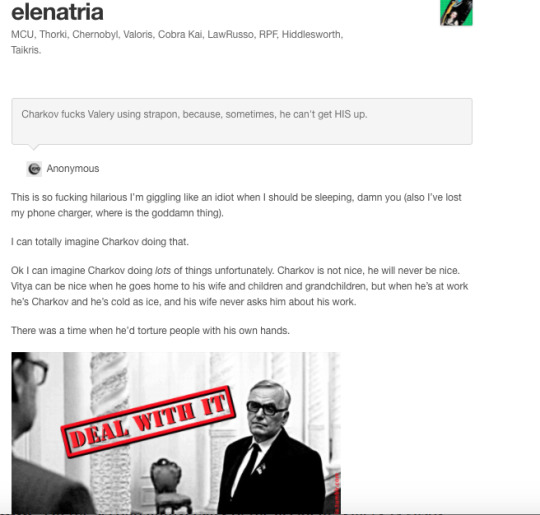

Here is more rape:

Their biggest argument is “We are writing fics about the fictionalized tv show characters” which is total and utter bullshit, because:

Nikolai Ryzhkov was not in the tv show at all.

Neither was Vladimir Gubarev. Why are they in those fics?
This isn’t all, there are public posts here where they were bouncing ideas and coming up with the most abhorrent fantasies about a real person who was NOT in the tv show. I don’t have the time to search them, plus they are really gross, you are better off not seeing it. (A paranthesis here: I’m totally indifferent about explicit fics if they involve only fictional characters and not promote rape culture. Just to make things clear.)
If you are using the names of real people, you are shipping real people. Period. I can write a fic using the shipper gang’s names in an alternate reality setting where they are an evil gang of cannibalistic cunts who raid maternity wards and butcher all the babies then burn puppies ad kittens alive for fun. Or I can write a fic where they all get sodomized with saguaro cacti dipped in ghost pepper sauce by sadistic rogue KGB agents. It’s fictionalized versions of them in an alternate universe after all, so it’s totally ok. Right? Well, there really is no point arguing these things, and that is not even the point of this post. I’m just saying it’s fucked up, creepy and wrong in every way.
Not to mention they bully and gaslight people who speak up against them. Grown ass women bullying a 15 year old and adding a transphobic comment after learning they are trans is NOT COOL. @ihatefandomsfuckyouall can testify as the target of their bullying. That’s wrong and creepy as hell.
HOWEVER. Like I said in the previous post, this won’t be about a holy jihad against shipping or some big anti-shipper crusade. Nope, nope and nope with nope sauce.
Ship away, ship all you want, ship till you drop, ship till you turn Fedex green with envy. I am not here to lecture sociopaths driven solely by primitive sexual instincts and bereft of any kind of boundaries, morals, common respect and decency. There is nothing I or anyone can do about it. Like i said, I have no intention of trying to talk sense into anyone or giving sermons. So rest assured that I am well aware it’s pointless and stupid to wage a war against shipping, however gross and vile it is. I can’t stop you from sexualizing anything that walks (or has been long dead) and spewing sick ass fantasies. I will repeat for those with two digit IQ: I know there is nothing I or anyone can do to stop you from doing what you are doing, absolutely nothing. So I will do NOTHING. Got it?
Whoever claims otherwise is full of shit, I will do absolutely NOTHING, you got my word 100%.
Seriously I won’t hate on you, I won’t call for holy wars and witch hunts. So, rest assured, I will not make any move against any of you, nope. Besides I don’t have the time for that, I have a busy life and better things to do. No war, no hate, no screaming, no drama, nothing. Is that clear? Capiche? Comprende? Понятно?
Well, now let’s get to the heart of the matter:
I have been quiet but not idle. I’ve been contacting people, sending queries, making phone calls, digging state archive repositories. I have been finding material and boy did I find material! I happen to be one of the very few people who are blessed with an extraordinary ability to find things no one else can find. You have seen what I can find by utilizing search engines and going through links. Even Craig Mazin himself was mighty impressed with my finds, the proof is out there in public view, I won’t bother digging it up now.
Anyway. It turns out I can find hell of a lot more than that by contacting people, sending queries, making phone calls and digging through state archive repositories. Some of it costs pretty penny but no matter, I don’t mind paying for never-before-published video footage that is not on the internet. Some of it is not even digitized so you gotta pay extra fee for digitization and it can be quite high depending on the video length and media.
We are talking about HD videos here. There is excellent AI video processing software out there which can turn even the most primitive 19th century videos to crystal clear 60 fps HD so we are good. (Example: https://www.youtube.com/watch?v=5HbElEqm1TQ)
I have photos that can’t be found by searching the internet. You’d drop dead if you saw some of them. I’m working on getting the full footage of Legasov’s IAEA presentation. It’s hella difficult, you have to personally go to Vienna and go through the seven hells and seven lower hells to obtain access. Also you need to be a research scientist with a reference letter. (All this info and list of requirements can be found on IAEA official site.) I won’t get into the details but I have it all sorted out, scientist and all. It wasn’t easy and it took a damn lot of time, effort, pulling family connections etc. Now the only remaining roadblock is this accursed coronavirus. As soon as the pandemic subsides a trip to Vienna shall be in order. The long Q&A session following Legasov’s report is unfortunately not available, but Legasov’s report certainly is (after fulfilling a laundry list of requirements.)
This is not all. There are photos (in addition to the publicly available ones I posted before) and video footage of Ryzhkov visiting Chernobyl, Legasov’s meetings, partial video of one Polituro meeting. There is this one precious footage where Legasov is laughing and drinking vodka. I won’t even say how many hours of work it took to find that. (Plot twist: I’m not the one who found it!) I have a pile of videos of Ryzhkov when he was the chairman of the council of ministers of the USSR, which are historical records of tremendous importance and not on Youtube. Buddies who have seen them had insta-man crush on him without even hearing my translation. Some of you would KILL for those, I know for a fact. For the Legasov drinking-partying video you would sell your soul to the devil (who wouldn’t?)
I have an IAEA report with an extremely rare photo you can’t find by searching. I won’t tell you who is in it cause I don’t want to supply anything you could use for your gross fics. Suffices to say one of them is someone you are drooling about and the other one is a big shot name that’s not on your radar and will unleash all kinds of fic ideas once you hear it. So nope. I ain’t giving you another Ryzhkov, I learned my lesson. I have video footage of that same man giving high praise to Legasov, talking with a tone of fondness, defending him against accusations. Such a sweet video. It put tears in my eyes. I can see you gang drooling a lake over that one so hell fucking no.
Did I mention I started translating Legasov documentaries? Every single one on youtube. Including the entire Звезда Полынь. Also planning to convert some Legasov footage to HD using the aforementioned software tools.
I have actually been posting videos and text material translations left and right, just out of your sight (nice rhyme, isn’t it?) 90% the material I listed above is either in the pipeline or in my hard disk.
@tryingtobealwaystrying can verify. She helped out a great deal with the IAEA business and I owe her one for that. We are both individually damn good at finding stuff but it turned out we can work wonders as a team. As a result, we have a treasure trove of the highest order in hand and in the works.
And, here is the deal:
YOU WILL SEE NONE OF IT.
N.O.N.E.
Not a shred. Not a pixel. Nothing. Ничего. Совсем нет.
Get it now? “You didn’t see it cause it’s not there!”
You won’t see it cause it won’t be there!
So, this is it. I can’t do anything about your shipping scumbaggery but I can cut off your supply and deprive you of material and information. You will NEVER be able to find any of it on your own (let alone afford the fees for.)
I will deprive you of the fruits of my labor.
Indefinitely.
Of course that doesn’t mean I’ll keep it all to myself. I will share them but not in public. In fact I have translated and posted some videos you wanted real bad, one of them got 1000 views overnight but they are not public, for my work is not for the eyes of the wicked and unclean miscreants. I post them in shipper-free foreign forums you can’t find and send links privately to decent, wholesome people who are interested in Chernobyl and Soviet history for the passion to learn and admiration for the historical figures, not for spinning depraved fantasies and writing horrendous, projectile-vomit-inducing sex fics. And -as those of you who possess three digit IQ’s might have figured out!- I am not alone in that. (Plot twist FTW!)
Congrats, folks. You managed to alienate and drive away the top Chernobyl-Legasov researchers and translators with your hideous debauchery, extreme scumbaggery and abominable attitude.
So, this is your punishment: NOTHING. This is the consequence you will deal with. This is the cost of your choices.
A big nothing is all you will ever get from now on.
See, told ya, there is absolutely nothing I can do about your gross shipping and scumbaggery so I will do NOTHING.
Got the joke? LOL. I have awesome humor don’t I :)
No more videos. No more photos. No more answers. No more translations. No more information.

You royally fucked up, people. You don’t get to eat the cake and the icing, especially not when you offend and insult the cooks, take a dump in the middle of the restaurant and masturbate while rolling in it. You could have kept it out of sight. You could have exercised some goddamn tact. But no, you had to behave like animals in heat.
Well, you can continue obsessing over the TV show scripts until you get sick of it.
I will be posting translations of different parts of Soviet history like the WW2 era. You can ship Hitler and Stalin all you want. Get those headcanons rolling! I will even give you a prompt: Stalin cheats on Hitler with Mussolini. LMAO.
You know what, I take back the not a pixel thing. We may post screenshots from the videos and low-res crops from the photos from time to time just to rub it in your face.
Here is one where they are grilling Velikhov shortly after Legasov’s suicide. Oh boy you gotta see his face when they start bombarding him about Legasov’s death....
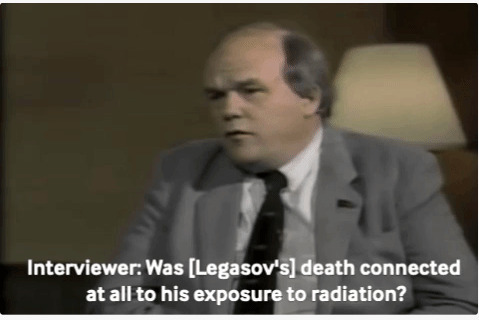
Here is the shot from a long video where the legendary Premier Ryzhkov is sporting the legendary 80′s Soviet glasses in all his superlative handsome glory. He is giving an interview about important historical turning points in this video and this isn’t even the best shot. You have to pay to get a copy but before that you need a superpower-like ability to find where it is in the first place.
I scaled it up to 1440×1080 but not gonna put the high resolution version cause I’m such a darling.

Here is Ryzhkov in the famous white work attire of the Soviet era. Looks familiar, yes? Do I need to tell WHERE he is and what he is doing? (Hint: The year is 1986.)
Oh man, oh man. How worried he looks, so heart-wrenching. The footage is only about 3 minutes but absolutely solid gold. I won’t say whether there is Legasov or Scherbina or BOTH of them appearing in this footage cause I’m such a sweetheart.

Unfortunately I am not at liberty to post any Legasov shots cause I am not the finder of the Legasov videos we currently have at hand. Too bad, so sad.
There you go. Enjoy your cold dish of nothing. Bon appetite.
Adios amigas!
WHAT IS THE COST OF NOT RESPECTING BOUNDARIES?
@tryingtobealwaystrying @the--arch @ihatefandomsfuckyouall @rarravai @weronikaisback @live-long-and-time-warp @tryingtobealwaystrying @chernobylgal86
#chernobyl#valery legasov#legasov#boris scherbina#valoris#chernobyl nuclear disaster#Soviet History#soviet union#ussr#shippers take all the fun out of life#like cockroaches in the picnic#this is why we cant have nice things#ACCESS DENIED#NO SOUP FOR YOU
55 notes
·
View notes
Text
The Guardian’s Oath, Part Seven
13The continuing saga continues... Rather than linking each previous section individually, I’m just going to direct you to the Master List, where you can find links to earlier chapters and to everything else I’ve written here.
Pairing: Feargal Devitt/ Finn Balor x OFC
Word count: 2,913
Content advisory: Nothing. Compared to the last couple of sections, this one’s practically a children’s story. (Except that it’s still a story about demons and death and 19th century sexuality and all that good stuff, there’s just nothing explicit in this part.)
I dressed myself while it was still dark, wincing from my invisible wounds, and went downstairs earlier than usual. I told myself that it was because I could do more productive things if I left my chambers but the truth was that I knew that the Reverend was still there, that he had not yet left to make his weekly rounds. He was in the kitchen, lightheartedly chatting with Kate over coffee and some toast about events in the town. They were surprised to see me but I thought that both looked pleased in their own way. I was especially happy to see that the Reverend’s eyes seemed to linger on me longer than usual.
Kate looked at me as if we were sharing some private joke and handed me a cup of coffee.
“You’re up early, Miss.”
“Thank you,” I said, taking the coffee from her. “I couldn’t sleep and so I thought I’d be better off just getting an earlier start to the day.”
“It’s nice to be able to see you before I leave,” the Reverend responded softly. “I don’t usually have the pleasure.”
I felt myself blush a little and I thought that Kate’s smile grew, although she turned back to the stove before I could tell for certain.
“I’ll make you something to eat then.” She stepped into the pantry, leaving the Reverend and I alone.
“I hope that the weather improves for you.” I nodded to the windows, slick with rain.
“Oh I’m used to it by now. The weather here is just one more way God likes to test my commitment, I think,” he laughed. “One time a couple of years back I got stuck on the road because it snowed. I thought we were going to freeze to death.”
“Well, I’m very happy you didn’t.” Almost immediately, I felt like I had gone too far. “I mean, we’re all glad that nothing happened to you.”
His luminous eyes fixed on me. “I’m happy to be alive, of course. All the more so since it’s allowed me to meet you.”
My cheeks felt as if they were on fire and I was saved from having to respond by Kate, who returned with a new loaf of bread to make more toast. Her eyes passed swiftly over the two of us and I thought that she looked just a little disappointed by something.
We all stayed silent while Kate fried up more toast, until the sound of a firm rap on the front door made us all jump. I was frightened, believing for a moment that something had come for me, that my demonic communion was about to be revealed. The Reverend and Kate, however, while they were startled by the sound, quickly realized what was happening.
“Oh don’t let that scare you Miss,” Kate reassured me when she saw my face. “That’s just the coachman come to pick up the Reverend.”
“Indeed,” the man himself sighed with a smile, “I am needed outside this home, although I hate to leave its comforts.”
He gave Kate a little bow before he spoke again. “Thank you as always for taking care of me so well.” Then he turned to me and took one of my hands in both of his, pressing a kiss firmly against my knuckles. “And I’m delighted to have seen you before setting out.”
He gave me a playful little wink that made my whole body grow weak.
“I shall be back a little earlier this week,” he declared on his way out, as if it were something he’d decided on the spot. “Late on Thursday night, most likely.”
“It will be a pleasure to have you here for the weekend, sir,” Kate beamed in response.
I gave an awkward sort of smile, not wanting to look indifferent but at the same time not wanting to let on how thrilled I was at the idea of having days with him.
“It’s wonderful seeing him so happy now,” Kate murmured. “And it’s you that brought this all about.”
“I didn’t do anything, really. I just followed William. It was by chance that he went to the cave where…”
“God doesn’t take chances,” she corrected me with a warm smile. “The boy would have died but for you and no one would have known where he’d gone. Fact is, this family’s needed that closure to move on since Mrs. Devitt disappeared and you helped bring that about.”
I shifted on my seat, feeling the ache at my core, the memento of the sins I’d committed in the name of bringing peace to the family. Perhaps I could be forgiven, I thought, because my intentions had been good. But then I thought of the lascivious pleasure I had taken in what I had done. Surely that damned me.
By late afternoon that day, I was feeling the effects of the night before. I was exhausted and in pain and I was struggling to focus on the children, who seemed more energetic than usual. A couple of times I had to protect them from Susan’s wrath when they tripped her and knocked over the basket of washing she was attempting to carry.
“Please, both of you, calm down!” I snapped, more harshly than I’d intended.
“Oh no, Miss MIles is ill,” Sophia cried. She and William had spent a good portion of the day pretending to be doctors and diagnosing everyone. “We must make her better.”
Both of them scrambled up on the divan where I was seated and started prodding at me: pretending to take my pulse, or check my forehead for a fever, or look at my eyes. In fact, it was more of an excuse for both of them to curl up against me and to trick me into wrapping my arms around them. Before I knew it, William’s arms were wound around my waist and Sophia’s were around my neck as she placed a cool kiss to my cheek. The affection felt strange and a little unnerving, something that the always observant little girl noticed right away.
“You don’t like to be touched, do you?” she asked sharply.
“Oh, it’s not that.”
“It’s all right,” she said, without releasing me from her embrace. “Is there a reason you don’t like it?”
My mind seemed to release a thousand thoughts at once, like a murmuration of birds that momentarily blocked the sky before dissipating. I felt like I wanted to answer her, like there was an answer, but I couldn’t access it.
“I… I suppose I’m not used to it.”
Sophia kissed my cheek more firmly than before. “It’s like you’ve never really had someone love you.”
William wriggled his way up so that his head rested on my shoulder. I felt flattered but also overwhelmed, like they were pinning me down in order to devour me. Nevertheless, I squeezed both of them close and enjoyed the happy giggles this elicited from them. Not for the first time, I marveled at Sophia’s keen mind: I hadn’t ever had someone show me kindness and affection the way that they did and, in fact, I wasn’t sure that I had ever been loved by anyone. Even hearing them say it felt strange.
“Well goodness, what do we have here?” Kate’s cheery voice cut through the moment of affection.
“I’m afraid I’m a little tired and I’ve been overwhelmed,” I moaned. “These two scientists were trying to revive me.”
“As much as I hate to interrupt this important work,” Kate said, playing along with the game that this was a gathering of professionals, “I need to request the assistance of one of these experts in the kitchen. The table needs to be laid.” Seeing that this wasn’t of much interest to either of the scientists, she added, “And I’m starting the Christmas pudding tonight, so I need someone to add the coins.”
William immediately jumped up when he heard that, leaving Sophia and I on the divan together.
“I’m sorry,” she whispered as soon as her brother and the cook had left. “We should never have asked you those things we did about unbaptized children.”
“Well, it was a bit of a surprise,” I mumbled. “Did the answers I gave you make sense?”
“Yes, absolutely. But I shouldn’t have asked. I’ve just always worried about Colin.”
“Who is Colin?”
“My- well, our- little brother,” she admitted, her voice filled with sadness.
“You had another brother?” I was astonished that I had not heard of something so important.
Sophia nodded solemnly. “He died.”
“I’m so sorry! What happened to him? When did he pass?”
“I don’t know,” she murmured, eyes filling with tears. “He just stopped coming.”
“What do you mean?”
“He never lived with us. I don’t know where he lived but he said that Mama took care of him.”
“He went somewhere with your mother?”
“After she disappeared, yes. He told me that she lived with him and that I shouldn’t worry about her.”
I couldn’t think of what to say next. How could I explain to this girl that her mother had almost certainly drowned the night that she disappeared? For that matter, could I even be sure of that? Was it possible that her mother had run off with another man? Was that why they had suspected that the Reverend had attacked and possibly killed her? “Sophia, does your father know that you spoke to this boy?”
She shook her lovely head a little. “Papa never even wanted us to speak about him. But it wasn’t my fault he’d come to see me.”
“Of course not,” I told her.
“I wish I understood what happened to him,” she sighed.
“I can well imagine. Even when we know that all things are in God’s hands, His work can still be painful for us to bear.”
After dinner, when the children went upstairs to prepare for bed, I was still worrying about what Sophia had said and while I didn’t want to betray her trust, I felt like I needed to ask another adult about what she’d told me. It wasn’t as if she’d sworn me to secrecy, I told myself. She’d intimated that her father might have some issue with what she’d said but I wasn’t going to speak to him.
“Did the Reverend and his wife have a third child?” I asked Kate as I helped her clear away the dishes.
“No, Miss,” she responded, avoiding eye contact with me.
“I was speaking to Sophia earlier and she said that there had been another baby, perhaps one that had died young. I was just surprised because I hadn’t heard of it before.”
Kate moved her lips as if she were about to repeat what she had said but I saw her shoulders slump. “I was afraid this might start up again,” she muttered.
“That what might start up?”
“I don’t need to tell you that it was terrible for the children to lose their mother at such a young age,” the cook sighed. “And especially with there being no real answer as to what happened. So for a while, Miss Sophia started to tell stories that she had a brother- Colin, she called him- and that her mother had run away with him. I suppose it was her way of coping with the loss but she became terribly obstinate about it and wouldn’t be told that it was all in her head.”
“And you thought that she might go back to those stories because Mrs. Devitt’s remains were discovered.”
She nodded. “I had sincerely hoped not. She was terribly defiant, even abusive, to her father sometimes and… well I’ve already told you enough of their mother for you to figure out why that hurt and worried him so.”
“He was worried that she’d inherited something of her mother’s alienation.”
“Yes. And may God forgive me for saying it, there are times I’ve thought he had reason to worry.”
“Well, perhaps it’s just a temporary turn for her in this case.” I locked my eyes on Kate’s with as much intensity as I could muster. “For the time being, it might be best that we not share this with the Reverend. At least, not unless she brings it up again.”
“Yes, Miss. I believe that would be for the best.”
I sat up in bed for much of the night, having exhausted every prayer I could muster to ask for protection for this fragile little home. I found myself jumping at the movement of every shadow, wondering if my demonic protector had come to taunt me, or to demand further acts of servility from me. I worried that somehow Sophia’s flight of fancy was his doing, that somehow he was putting these thoughts in her mind as a threat or a show of power: I felt that by showing me how easily he could hurt her, he was guaranteeing that I would do whatever he asked.
Given my agitated state, my first thought when I heard faint noises coming from downstairs was that I was imagining things. But while I tried to focus on ignoring them, the sounds persisted and I finally realized that there was something stirring in the house. Wrapping myself in my robe, I descended to the floor below and approached the door to the children’s room. Opening it a little, I could see William asleep in his bed. I went to lean in a little further to confirm that his sister was in hers, but as I did, I heard a muffled scraping and rattling sound that emanated from the ground floor. Quickly, I sauntered to the stairs and slowly made my way down.
I could make out very little in the darkness but I was able to follow the sounds to the front door, where I found Sophia fidgeting with the key and the handle. As I approached, I realized that she was walking in her sleep, unaware of where she was or what she was doing. I approached as quietly as I could, not wanting to startle her.
“Sophia,” I whispered, getting no reaction. “Sophia, you need to come back to bed.”
A few seconds passed and finally I saw a change in her expression, enough to encourage me to lean in a little closer.
“Sophia?”
She let her hand fall from the door key and pivoted her face to look at me. Her eyes were still remote and uncomprehending but I could tell that she was at least aware of my presence.
“Will you let me take you back to bed?”
She frowned and gave me a little nod, allowing me to take her hand. It was icy and I immediately gathered her up against my body to warm her up again as I carried her back to her room. l laid her to rest wrapped up in her blankets without her ever fully awakening and I was pleased to see that William’s slumber was unbroken as I left them to their dreams.
I was about to return to the attic when it occurred to me that I should make sure that she hadn’t actually managed to open the door. As it happened, it was good that I checked because it was ever so slightly ajar. I pushed it to and as I did, I saw something flutter to the ground. Picking it up, I realized it was a scrap of dark fabric, rough like sacking but thicker.
Although I told myself it was probably nothing, I pulled the door back to see if there was something outside that would explain the presence of the cloth on our door. The moon was full and bright and illuminated everything in the yard so that my eyes took a moment to adjust. When they did, everything appeared peaceful, even the wavering of the tree branches in the wind. The gate was closed and the road was empty as far as I could see. It was only when I lowered my eyes that I saw the marks: three vertical lines scratched crudely into the stone before the door.
I looked around wildly, even though I knew there was nothing to see. Always those same marks, never any clue as to their meaning. Whatever it was he sought to communicate, and I was certain I knew who was responsible, the message was not meant for us to understand. The thought of him playing his little game while Sophia hovered innocently on the other side of the door made me angry and I rubbed at the marks with the coarse scrap of fabric in my hand until I was satisfied that I could no longer see them. I took extra care to make sure that the door was locked before retreating to my chambers and once there, I sat close to the window for the remainder of the night, straining to pick out any sign that we were under imminent threat.
There were no further disturbances that night and the next morning, Sophia recalled nothing of her adventure. In fact, she seemed to find it funny when I told her what had happened. Nevertheless, I remained on edge throughout the day and when I had the opportunity to do so, I dropped the scrap of fabric I’d found the night before into the fire. I had never thought of myself as a superstitious person, but I wanted it gone from the house, never to return.
#wrestling imagine#wrestling fanfic#wayward wrestle writing#finn balor imagine#finn balor fanfic#wwe fanfiction#wwe imagine#nxt fanfiction#nxt imagine
7 notes
·
View notes
Text
Happy International Men's Day!
Happy International Men's Day to everyone! ^^
Yes, it is a thing. I think it should be celebrated more. It is not fair that only the ladies get a day that is drummed up as something world-changing (which it's not, let's be real here).
So if we are listing off women of history, I'ma do the same with some men from the history of my country, Hungary! :D
Árpád, Son of Álmos, Leader of the Seven Hungarian Chieftains - it was Árpád who officially led the nomadic Hungarians to their future home of the Carpathian Basin, and thus starting the land-taking in 895. Árpád was a wise and brave leader who was always the first in charge and last in the deceptive retreats Hungarians were known for. He has a fun myth to his name, in which he is said to have tricked Svatopluk I of Moravia into gifting the Hungarians the entirety of the Basin's lands, in exchange for a single white horse equipped with a golden rein and saddle. Árpád, while not a king himself, was the ancestor of the first house of Hungarian Kings, hence the name "House of Árpád" of that dynasty.
Saint Ladislaus I of Hungary, from 1077 to 1095 - our warrior king, Ladislaus was famous for his tall and powerful stature and for always leading his men in battle. He conquered Croatia, pushed back the Cumans and Pechenegs and secured the Eastern borders for 150 years, put some goddamn order within a conflict-torn Hungarian Kingdom. Ladislaus later turned into the perfect "Knight King" in the eyes of many and his name and sacred herma was often called upon or even carried into battle during wartime.
Count István Széchenyi de Sárvár-Felsővidék (1791-1860), the "Greatest Hungarian" - a Hungarian noble from a long-standing family, he was pretty much in anything and everything you can imagine. He was part of Hungary's first government during the Revolution of 1848-49, he was an author, an economist, royal chamberlain, founder of the Hungarian Academy of Sciences, commissioner of Budapest's most beautiful and famous bridge, the "Chain Bridge" (and the first bridge where the nobles also had to pay a fee for crossing), supporter and commissioner of Hungary's first Hungarian-speaking theater (a huge deal back in the Austrian Habsburg-controlled years), which later became the National Theater. Count Széchenyi's actions eventually led to the development of our national identity and pride.
Ignaz Semmelweis, Savior of Mothers (1818 - 1865) - a Hungarian physician and scientist who discovered and effectively countered the cause of the deadly childbed fever, a terrible and sudden disease that often led to the death of the new mothers. He had developed a thorough handwashing technique with disinfectants that led to the drastic drop of childbed fever cases in the mid-19th century. Sadly, his idea originally had been mocked and waved aside, which led to him suffering a mental breakdown and soon after dying in an asylum. Years after his death, his practice earned wide-spread acceptance however.
János Irinyi, Inventor of the Matches (1817 - 1895) - chemist and inventor of the noiseless- and non-explosive matches, and was the founder of the first match factory in Budapest. He took part in the Revolution of 1848-49 and was tasked with the manufacturing of cannons and gun powder.
Ernő Rubik, The Nation's Artist (1944 - ) - sculptor, architect, interior designer, inventor, toy designer and university teacher, receiver of the Kossuth Prize, the highest acknowledgment that can be given for achievements in science, culture and the arts. If his family name sounds familiar to you, that is because he is the inventor of the Rubik's cube, from 1974! :D
There are many many more. So much more. But I'll cut it here and stop rambling. So again, Happy International Men's Day!If you guys know of men in history you are proud of, do share them with me, so I can learn more as well!
Take care and keep being awesome everyone!
2020.11.19
5 notes
·
View notes